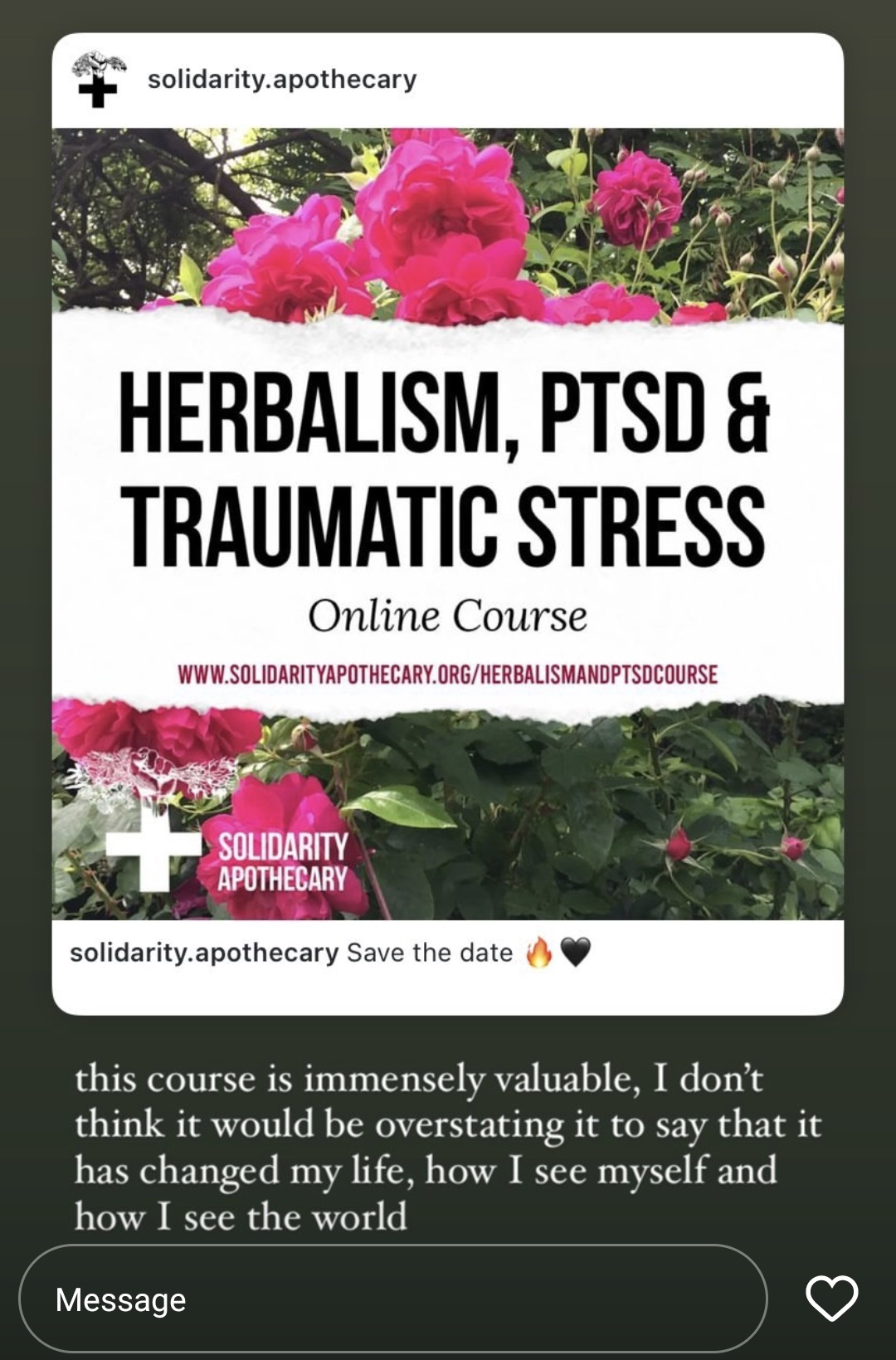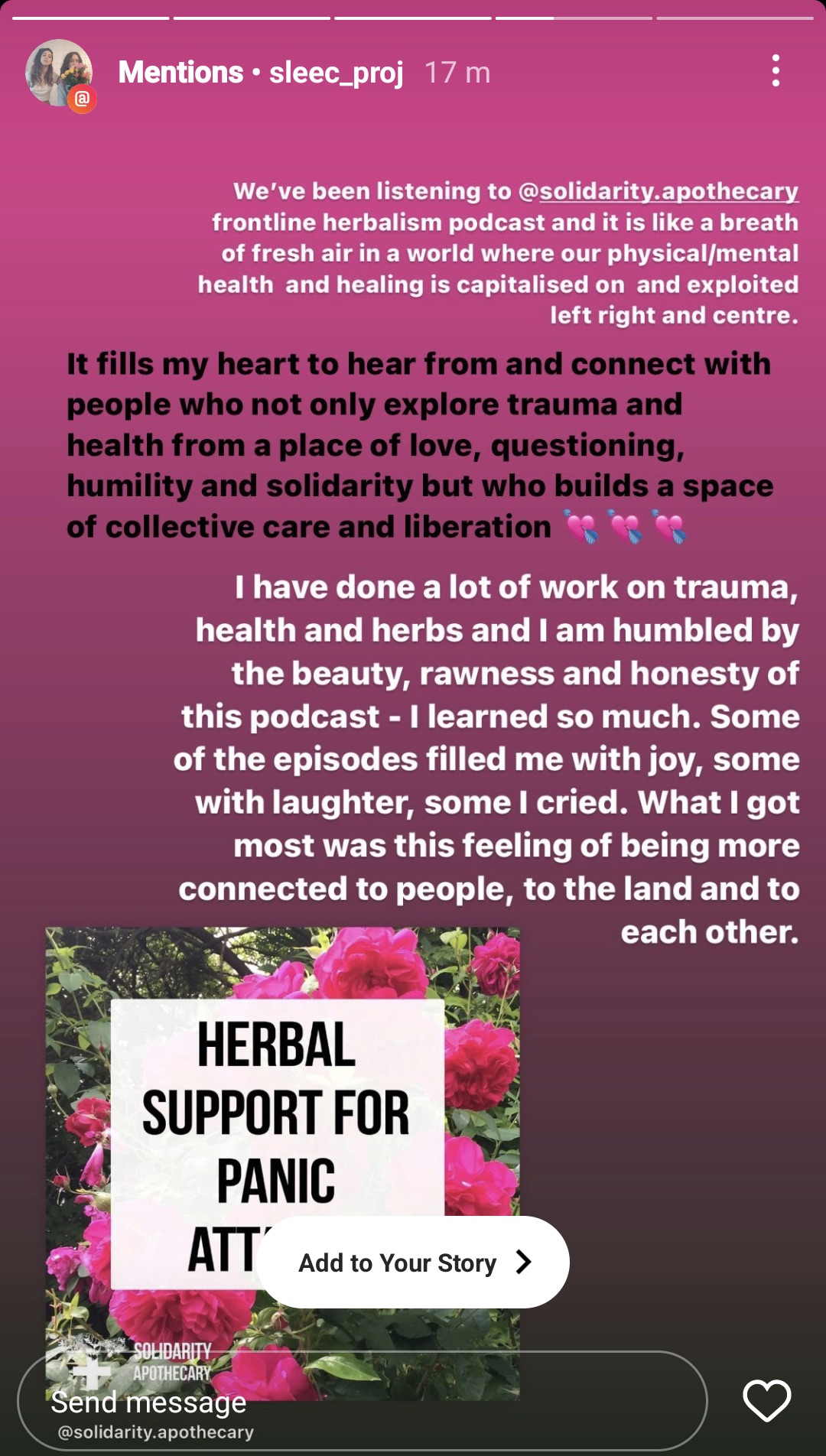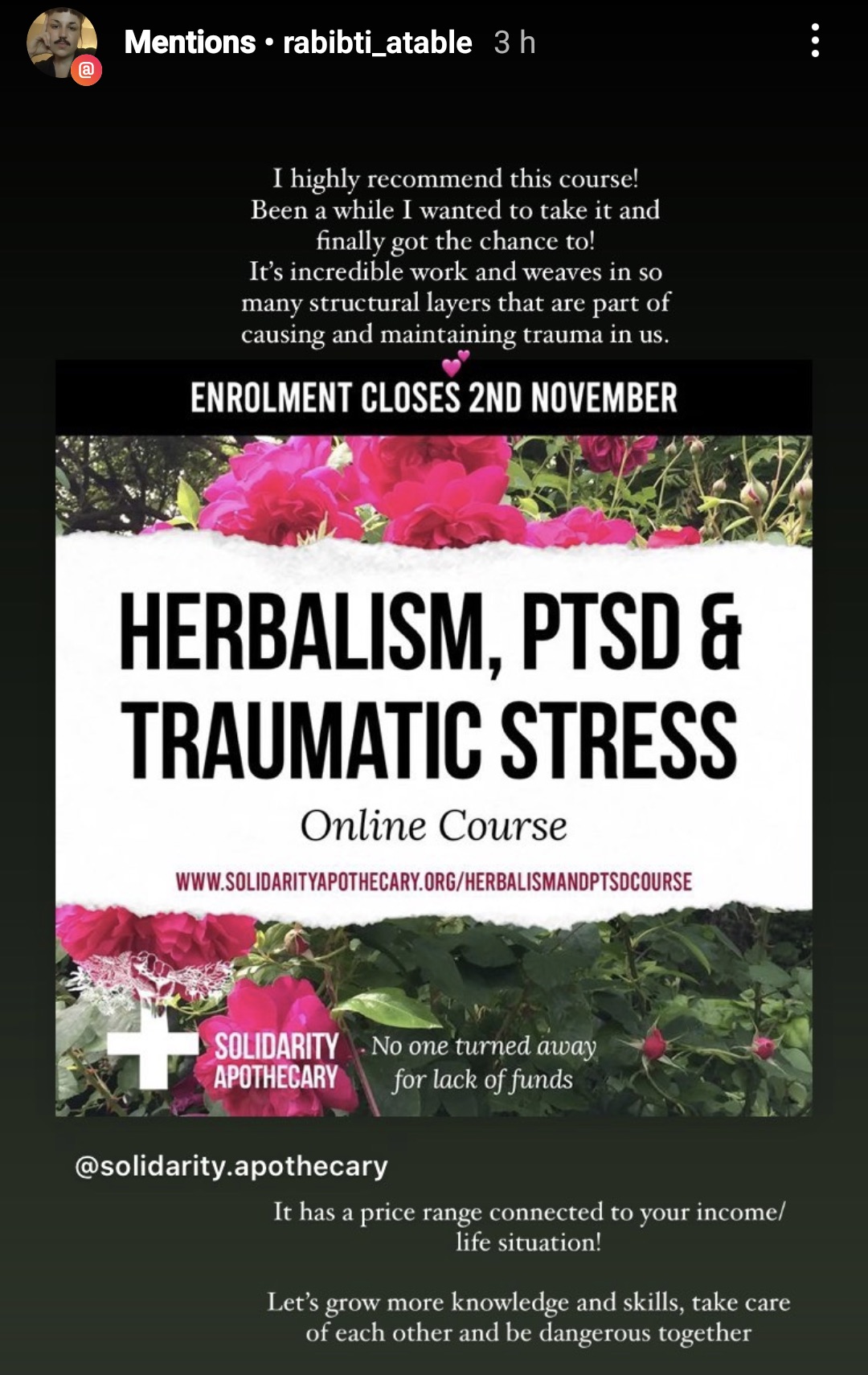Herbalism, PTSD & Traumatic Stress Course
In a world full of injustice and oppression that can be deeply traumatising, we need plant medicines more than ever. In this self-paced online course, you will be supported to build relationships with plants to help take care of your nervous system, your health and your loved ones for the long-haul.
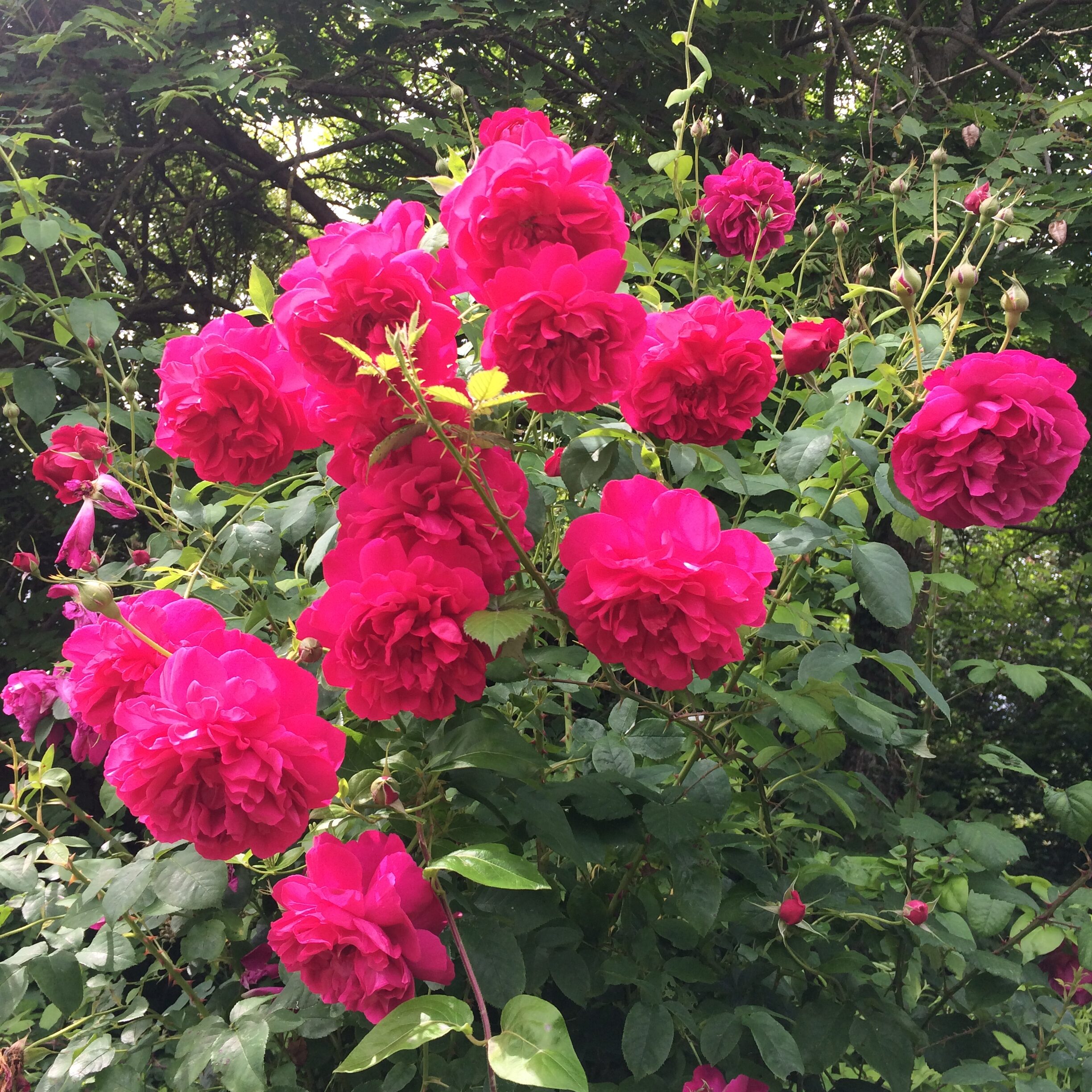
This course will help you gain an understanding of how trauma shapes the body, and how we can reclaim and reshape it. You will also develop an in-depth knowledge of plants and nervous system physiology, grounded in an anti-oppressive analysis. This course will not only help you learn the theory, but most importantly it will aid you in embodying the practice. The course is structured and has resources to enable you to gain the practical herbalism skills you need to transform your life and find some respite from the relentless rollercoaster of PTSD (Post Traumatic Stress Disorder) and traumatic stress.
Open for enrolment this September
The course will open for enrolment oin March/April 2025.
Sliding-scale
Sliding-scale pricing. No one turned away for lack of funds.
Self-paced learning
Complete at your own pace for as long as you need. Lifetime access.

Plants take care of us when our bodies express the distress we feel
PTSD can be unrelenting and unforgiving. Unlike common trauma narratives, what we are going through isn’t always in the past. It’s not always historic experiences remaining unprocessed in our bodies. Traumatic stress can be ongoing and be very much in the present. And unfortunately, it is often a big exhausting mix of both - past and present.
Whatever we’ve gone through, or are going through, our bodies express distress in different ways: anxiety, panic attacks, nightmares, flashbacks, insomnia, bouts of anger and rage, digestive issues, headaches, regular coughs/colds/infections, chronic inflammation, muscle pain and more. Plant medicines can support us to manage and recover from many of these symptoms to help us find steady ground in what can feel like a world of chaos.
Plants take care of us when we struggle to trust humans
For people who've had their trust in humans shattered, the more-than-human world offers relationships of love, connection and stability that can help people survive what they should have never had to endure. Plants can teach us new ways of being in our bodies and help us move into a more "parasympathetic" nervous system state aka ‘rest and digest’.
Feeling different is bigger than ingesting a herb through a tincture or a tea. It is the act of herbalism itself - being outside, growing plants, foraging, medicine making - that heals us. This course introduces these practical skills so that you can form a rich relationship with the world around you and feel supported. With plants, you are never alone.
Plants take care of us over the long-haul as we survive what is f**ked up in the world, and transform it together
The world isn’t likely to become less traumatising any time soon. Equipping ourselves with the skills to take care of ourselves and each other is essential. Herbalism is a life-long journey. Plant medicines can transform your life by enabling a deeper relationship with the land, improving sleep and digestion, preventing disease, reducing inflammation and aiding the nervous system to rest and recover while surviving and resisting this oppressive world.
This course teaches you the principles and frameworks on which herbs to choose, and why, for your unique constitution, health history and needs. It encourages experimentation - for you to work with different plants and see which work for you better than others. Our goal is for you to be able to build a medicine cabinet of allies that can support you negotiating and navigating a lifetime of experiences.

What's Inside the Herbalism, PTSD & Traumatic Stress Course
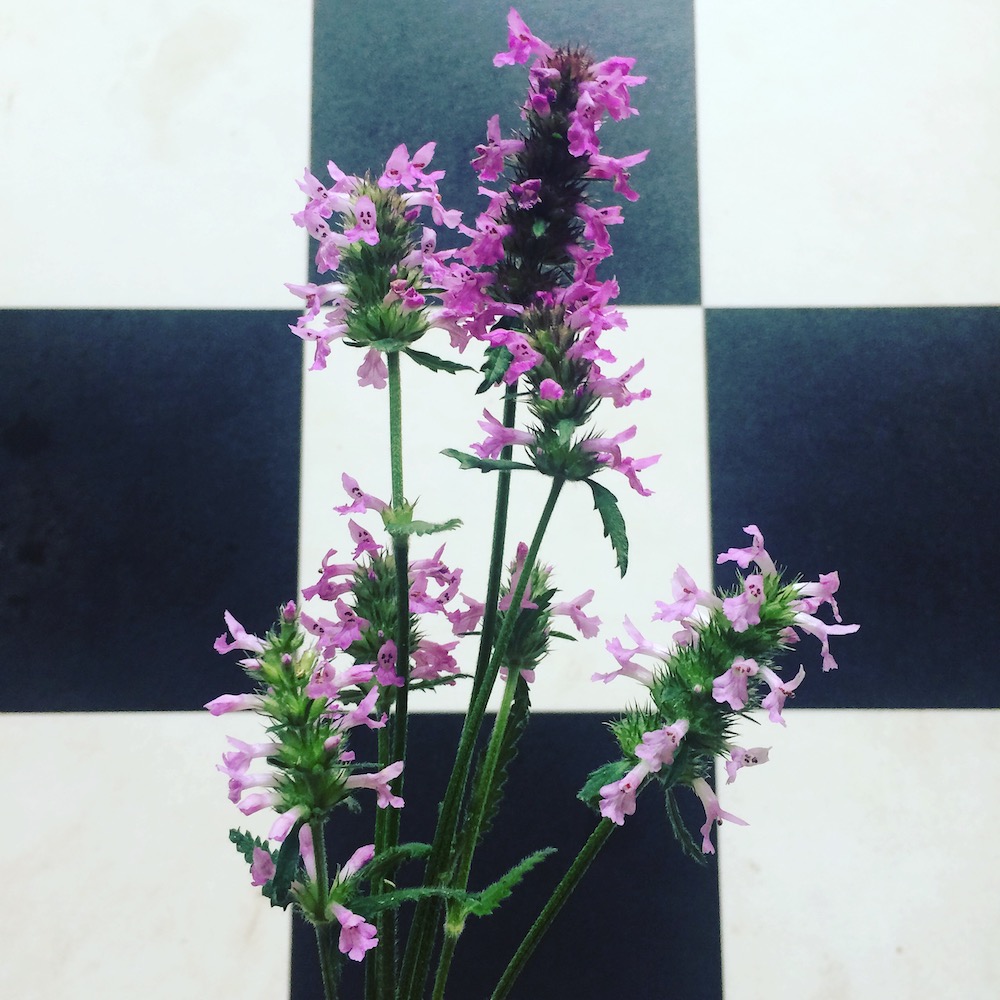
Module 1: What is trauma?
This module explores the question ‘What is trauma?’. We look at the reductionist ways trauma is commonly framed - that it’s a result of faulty brain chemistry, that we are sick, insane or ‘mad’. We explore trauma as forces of the world around us that shape us - from racism to ecological destruction. We dive into common trauma dynamics such as lack of safety and support, powerlessness and ‘dysregulation’.
Lessons include:
- What is trauma?
- How trauma is framed in the global North
- Exploring liberating ways of framing trauma
- Common trauma dynamics
Module 2: Herbal foundations
In this module, we look at important herbal safety information, ways to work with plants (medicine making, foraging, journaling and more), and the many incredible medicinal actions that plants have. We introduce a framework for looking at constitutions, tissue states and energetics. We also look at the role of plants in the essential foundations for health - sleep, movement, digestion and nutrition.
Lessons include:
- Starting or deepening your journey with plants
- Herbal Safety
- Understanding herbal actions
- Constitutions, tissue states and energetics
- Essential foundations for health
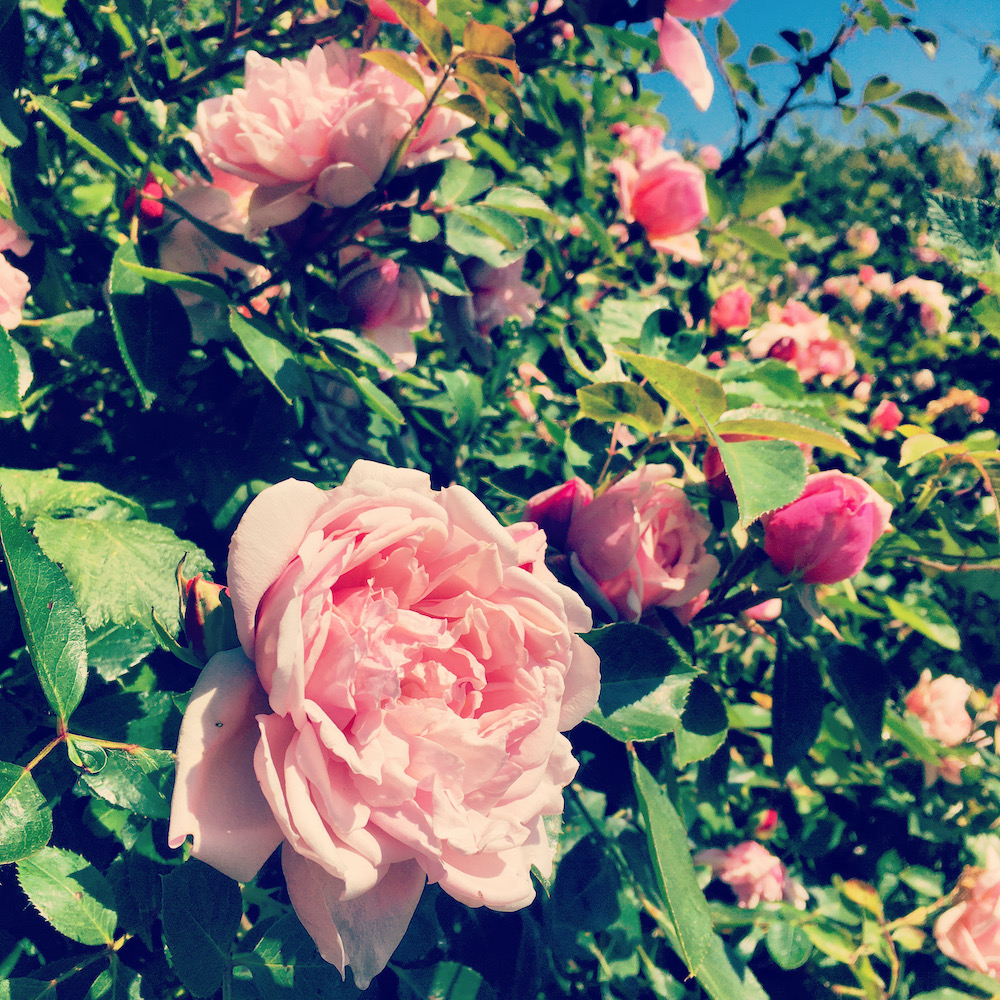
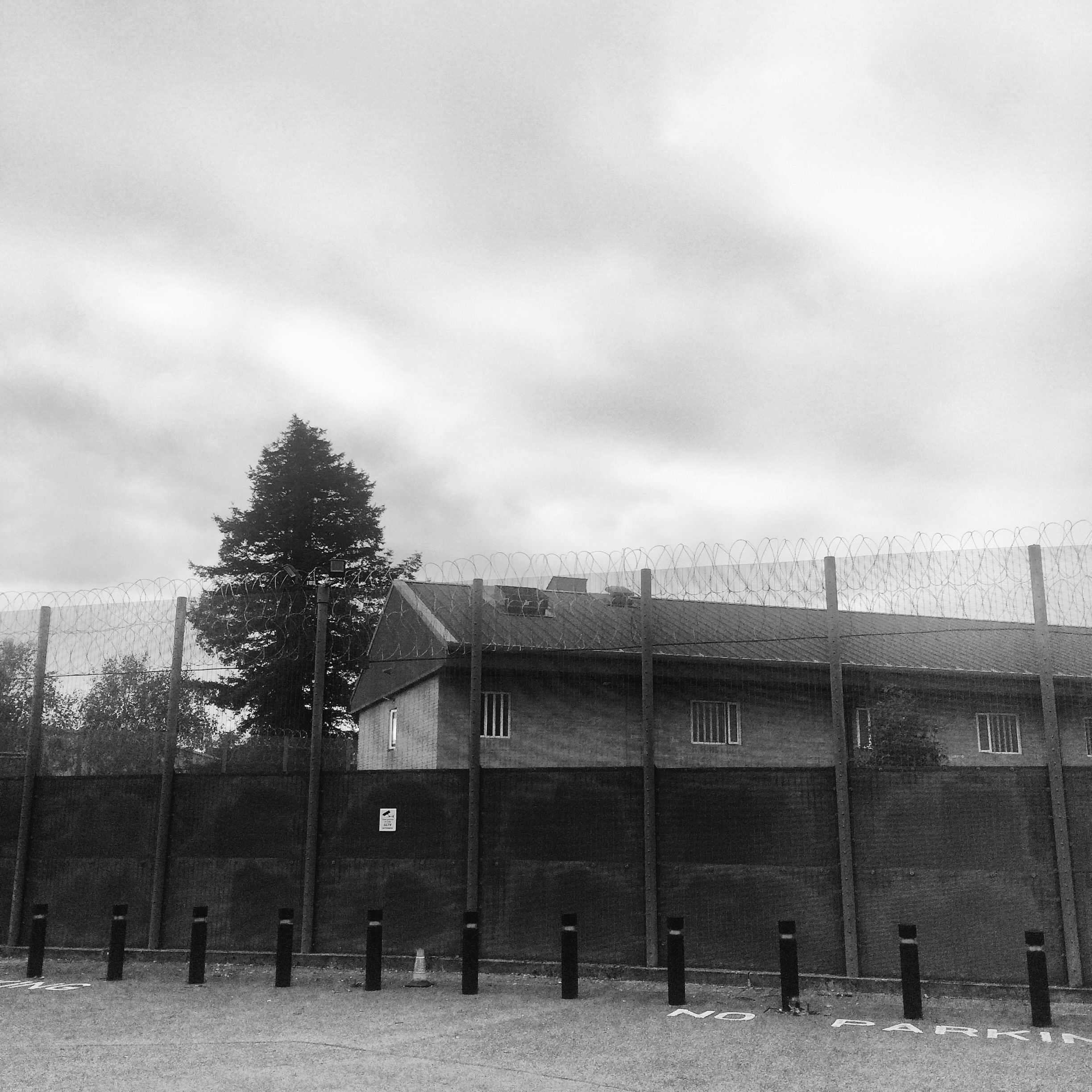
Module 3: How trauma shapes the body
There are 8 billion people on this planet and 8 billion ways people experience and process trauma because we are all unique. Our bodies express distress in multiple ways, which are different for all of us. This module explores common trauma symptoms and how trauma can impact our bodies - from triggers and flashbacks to autoimmune conditions and chronic inflammation.
Lessons include:
- How trauma shapes the body
- How the body expresses distress
- Trauma, chronic illness and inflammation
Module 4: How we can shape it back
In this module, we take a deep dive into understanding nervous system physiology. We look at different frameworks for describing states of being, such as polyvagal theory (a framework on how the autonomic nervous system has evolved to keep us safe and alive). We introduce the roles of plant medicines in shifting how we feel and explore some of the goals we can aspire to in healing and feeling differently.
Lessons include:
- Nervous System Deep Dive
- Polyvagal Theory
- Healing goals
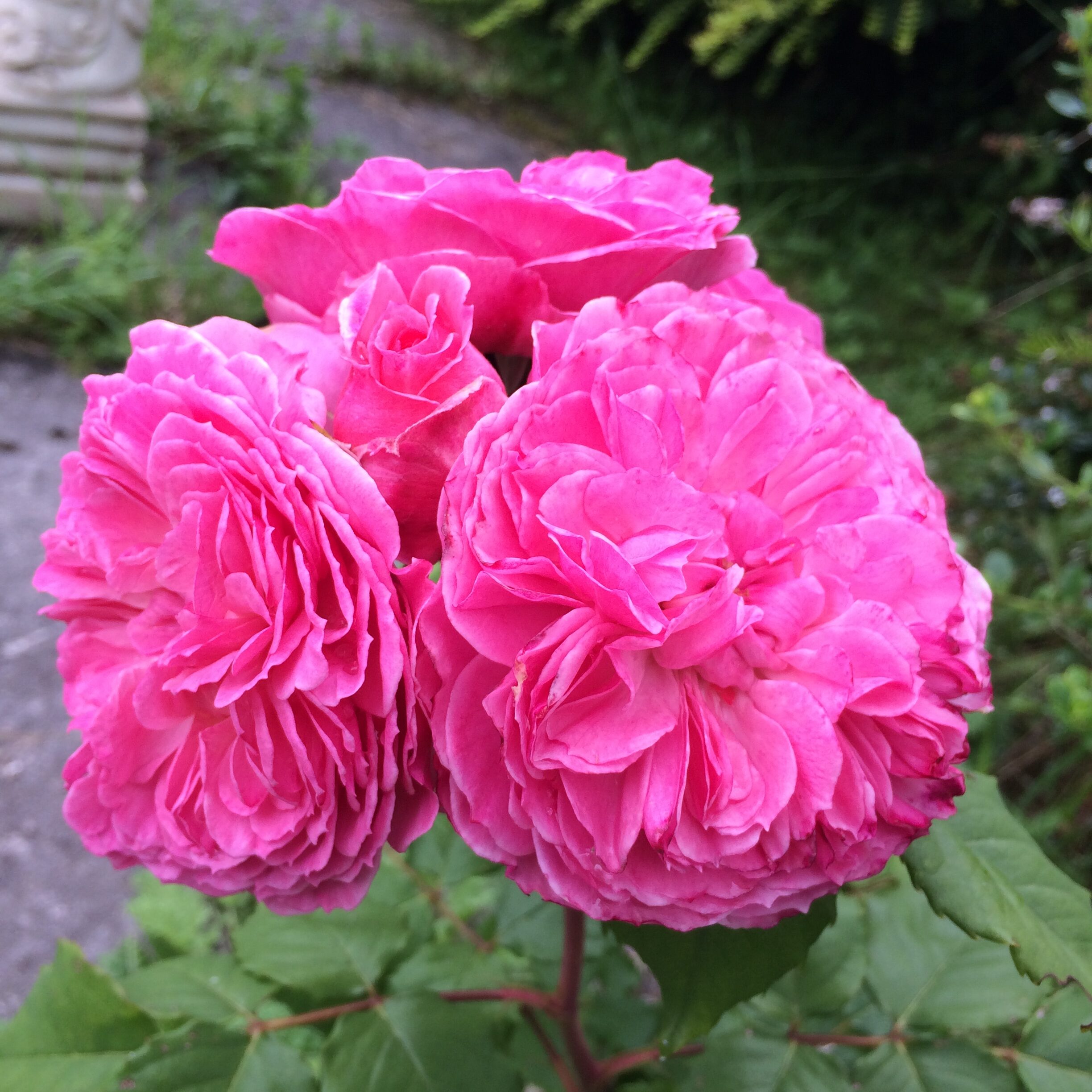
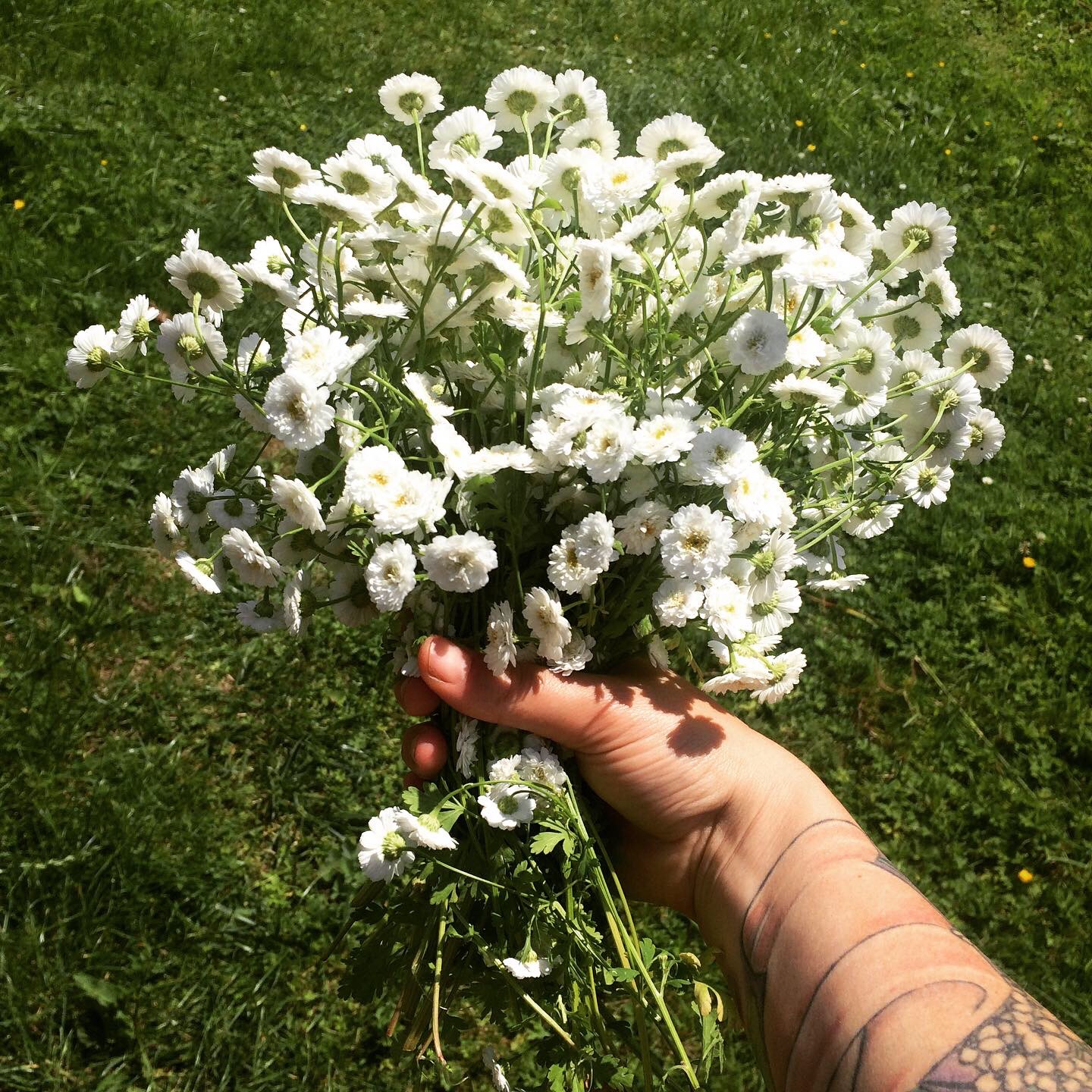
Module 5: Collective responses to traumatic stress
This module introduces a framework exploring radical responses to traumatic stress. We look at the many individual and collective practices that can aid trauma recovery. Plant medicines are one tool in the toolbox - in this module we look at their role in each of these necessary stages to help explore the diverse role of plant medicines in trauma recovery.
Lessons include:
- Deconstructing ‘trauma recovery’ and introducing the radical trauma response framework
- Release
- Rest and renew
- Reconnect
- Resistance
Module 6: Nervines Deep Dive
We begin our series of lessons taking a deep dive into nervines - plant medicines that have an affinity with the nervous system. We introduce herbs which enable our body to feel calmer and grounded, prepare us for sleep and allow us to move into a more parasympathetic (rest and digest) state. We also look at nervine tonics - herbs which act to tonify, strengthen, and restore the proper structure and function of the nervous system. They are a key tool in enduring and recovering from traumatic stress.
Lessons include:
- Working with nervines
- Relaxant nervines deep dive
- Nervine tonics deep dive

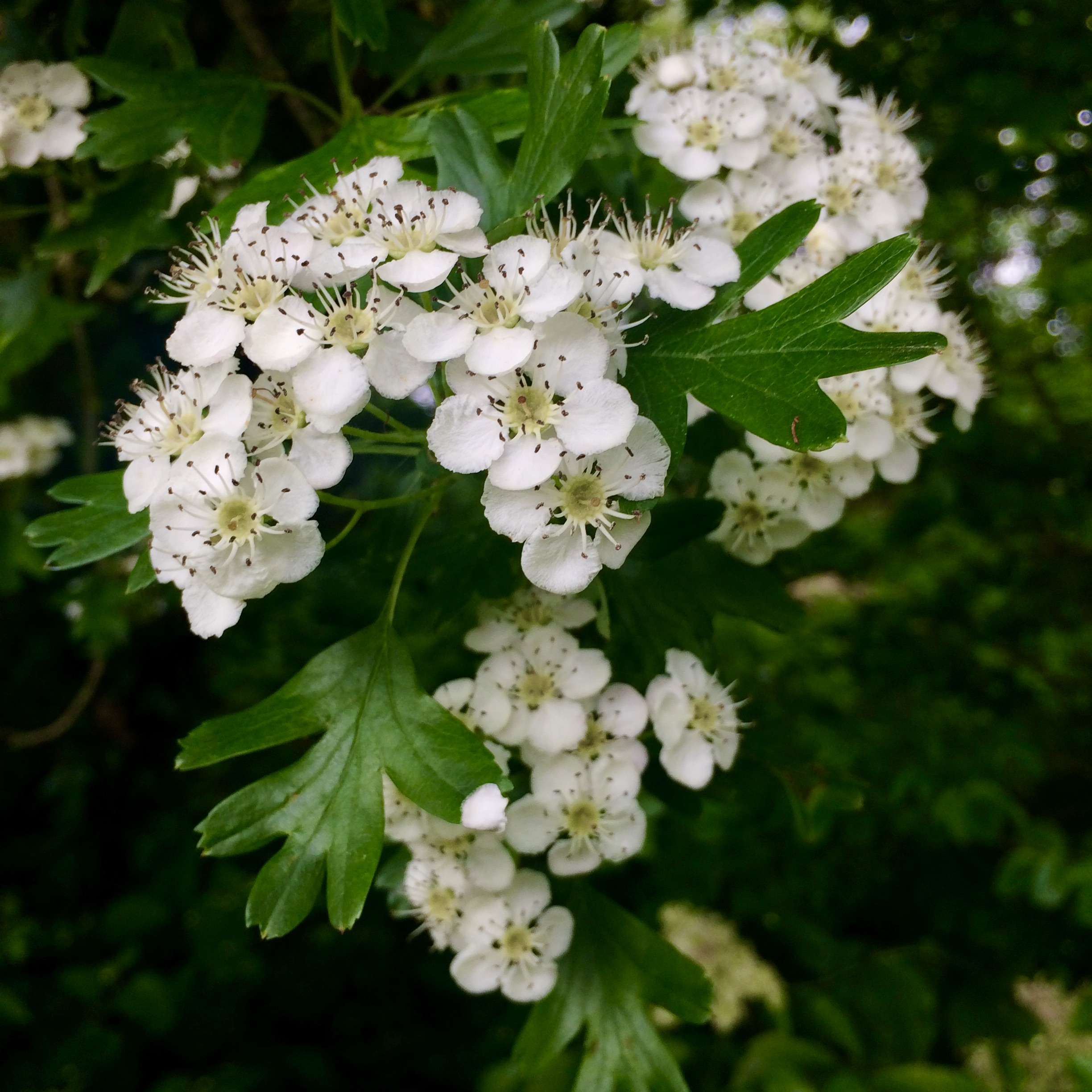
Module 7: Nervines Deep Dive, Part Two
In this module we explore some of the more ‘hypnotic’ and sedative nervines that can help to induce a stronger relaxant effect and a deep and healing state of sleep. We also take a deep dive into cardiac nervines that have an affinity with the heart and cardiovascular system. Finally, we cautiously explore stimulating nervines that can be indicated in some cases which have a direct stimulatory effect on the nervous system.
Lessons include:
- Hypnotic nervines
- Cardiac nervines
- Stimulating nervines
Module 8: Practically working with Plant Medicines
This module introduces many of the incredible ways we can make medicine with plants with how-to guides on tincture, glycerite and infused oil making. You will learn how to harvest herbs and make potent medicine for yourself safely, effectively and sustainably. This module will also explore case studies of how plant medicines have supported people with PTSD and traumatic stress in their lives, so that you can have a clearer idea of effective ways to support yourself with plant medicines over time. You will make an implementation plan for yourself and identify clear next steps to put the program into practice.
Lessons include:
- Working with plant medicines in practice
- Harvesting herbs
- Introduction to medicine making
- Case studies
- Your implementation plan
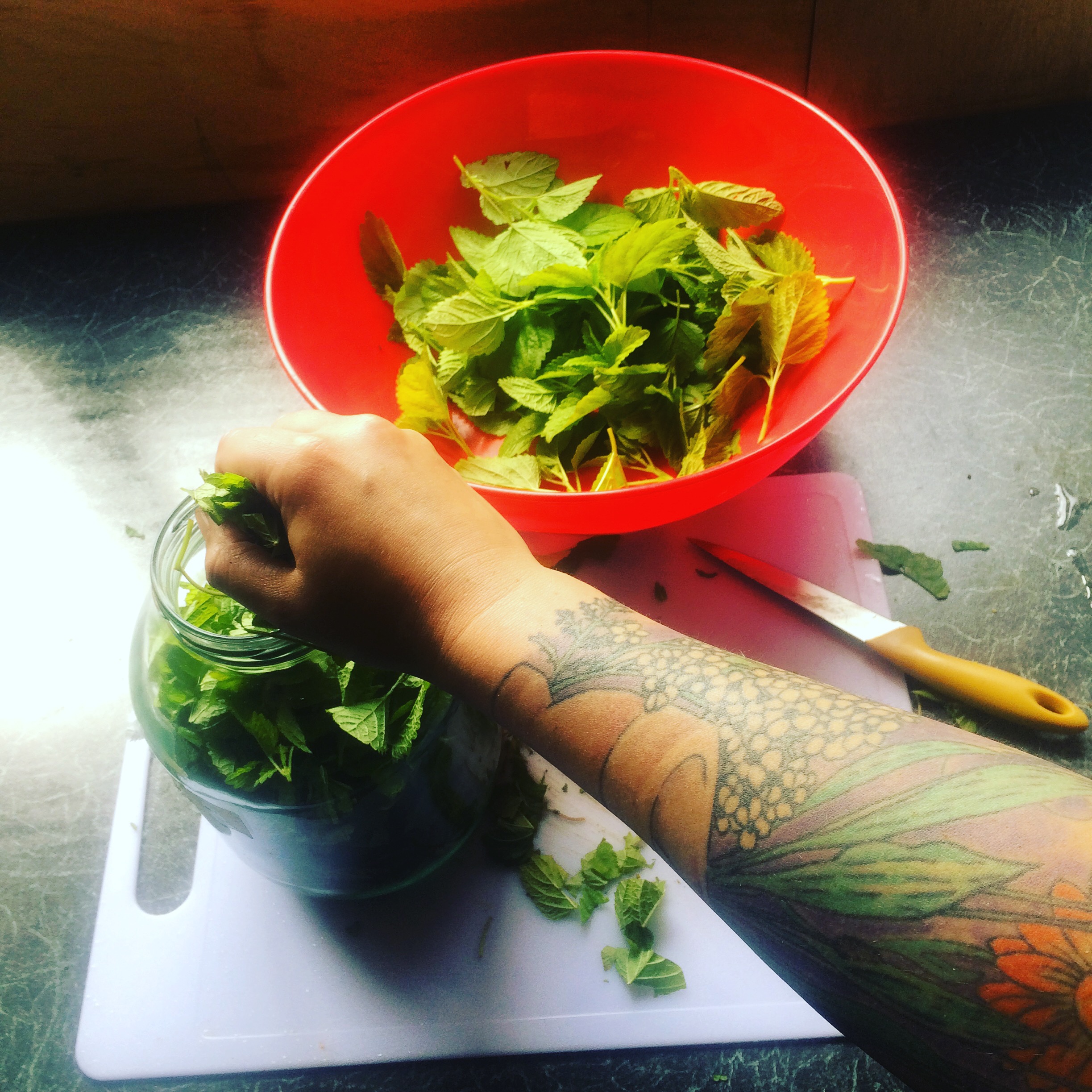
Begin your journey with plant medicines
Be the first to know when the course is launched. The enrollment window opens on Wednesday 18th September 2024. People who join the course waiting list in advance will receive a course discount.
Self-Guided, Zero-Stress Learning
Zero Time Stress
Complete at your own pace for as long as you need. Lifetime access.
Zero Achievement Pressure
No assignments, quizzes 'grading', or essays. Study for pleasure.
Zero Disclosure Pressure
No triggering group calls with strangers discussing deeply sensitive life experiences.
No Exhausting Information Overwhelm
No forums, messages or overwhelming information to keep up with. Study when you have the headspace, energy and desire.
Freedom for your Learning Style
Beautiful, highly visual presentations. The ability to download lessons as audio files for when you're on the move. Practical exercises, journal prompts and action steps. Resource lists for each module so you can check the references & deep dive into source material as much as you wish.
Flexible access to content
Freedom to 'chop and change' between lessons. Study in the order you want following your interests and passions.

How much does the course cost?
Solidarity Price
£0 . 00
- Refugees, asylum seekers & people without papers
- Former prisoners & detainees
- Low-income prisoner & detainee family members
- Low-income organisers experiencing state repression
- Anyone in financial distress unable to meet their basic needs
Standard Price
£225 . 00
£45 x 5 months
- For people in employment or with a steady income
- For people able to meet their basic needs and afford extras (holidays, takeaways etc.)
- For people with some savings and safety net
Resourced Price
£375 . 00
or £75 x 5 months
- For people with access to unearned generational wealth e.g. trust funds, family allowances, living off inheritance
- For people who own a house or own more than one property/are a landlord
- For people with larger than average savings/pensions/investments beyond your daily cost of living
- Being a middle to high earner in terms of work/waged labour
Why a sliding-scale?
My sliding scale involves three different packages aimed at people with different levels of financial resources, as well as people affected by different forms of systemic oppression. You can read through the packages above in more detail. In short, people on low-incomes pay less and financially-resourced people pay more. It’s an (imperfect) way to create a more economically liberating model while we work to create different economic systems.
Class is complex. It is inseparable from other forms of oppression (racism, sexism, transphobia, ableism, etc). People do not fit into neat categories or into neat sliding scales. Capitalist society generates and perpetuates a feeling of scarcity, for many this is acutely real (e.g. poverty), for others it is an emotional feeling of instability and fear which is also very real. Studies have shown that even millionaires feel that they do not have ‘enough’. Therefore, a sliding scale is a bit more complicated because of our different relationships with money - hence why it is important to integrate an analysis of systemic oppression and class rather than an emotional feeling of what you can afford.
When you enrol in the course there will be different payment options at checkout, including the ability to spread payments across three or five months. There will also be an option to check-out just offering a donation of what you can afford (including nothing). Please note as part of my anti-capitalist principles, no one is turned away for lack of funds.
Thank you for caring about liberation.
About Nicole & the Solidarity Apothecary
I’m a clinical herbalist and anarchist organiser based in the Westcountry of England (in Somerset, south of Bristol). My lineages are English, Welsh and Irish. I have been studying herbal medicine informally for over 15 years. I completed a four-year clinical training with The Plant Medicine School in Ireland to develop my skills as a practitioner.
As a herbalist, I focus on supporting people experiencing state violence, most of whom live with debilitating PTSD or are surviving ongoing traumatic stress. For better or worse, prison has shaped my adult life. I’ve been supporting partners, friends and comrades in prison for the last eighteen years. I did a three and a half year sentence myself after a huge wave of state repression against a campaign to close down Europe’s largest animal testing company. Plants sustained me through my sentence and many years later I wrote the Prisoner’s Herbal book which is now distributed to prisoners worldwide. I'm also the author of the book Overcoming Burnout that links recovery from burnout with wider systemic forces such as classism, sexism, poverty, chronic illness, ableism and power dynamics in groups. It focuses on models of collective care and mutual aid.
Why do I do this work?
In 2016 I got sick, really sick. My life became a blur of NHS appointments, fear and confusion. Accessing the work of other healthcare practitioners, such as herbalists, was a constant financial struggle that delayed my recovery. When I did see them, it often felt so alienating as a working class person who had been brought up by a single mum. It felt like people couldn’t comprehend the things I’d been through including state repression, abuse and sexual violence, poverty and incarceration. It felt like we were on different planets. It took me a long time to learn and gain an understanding of how traumatic stress truly shapes our bodies and how to navigate my complex PTSD diagnosis.
As I developed my practice, I kept wishing I had an online resource that I could refer people to that could help them understand the distress they were experiencing and how it is possible to feel differently. I believe people deserve to access the knowledge themselves about their bodies, about plant medicines, about how to make medicine - so I created this course. Plants have kept me alive. I know they can support you too.

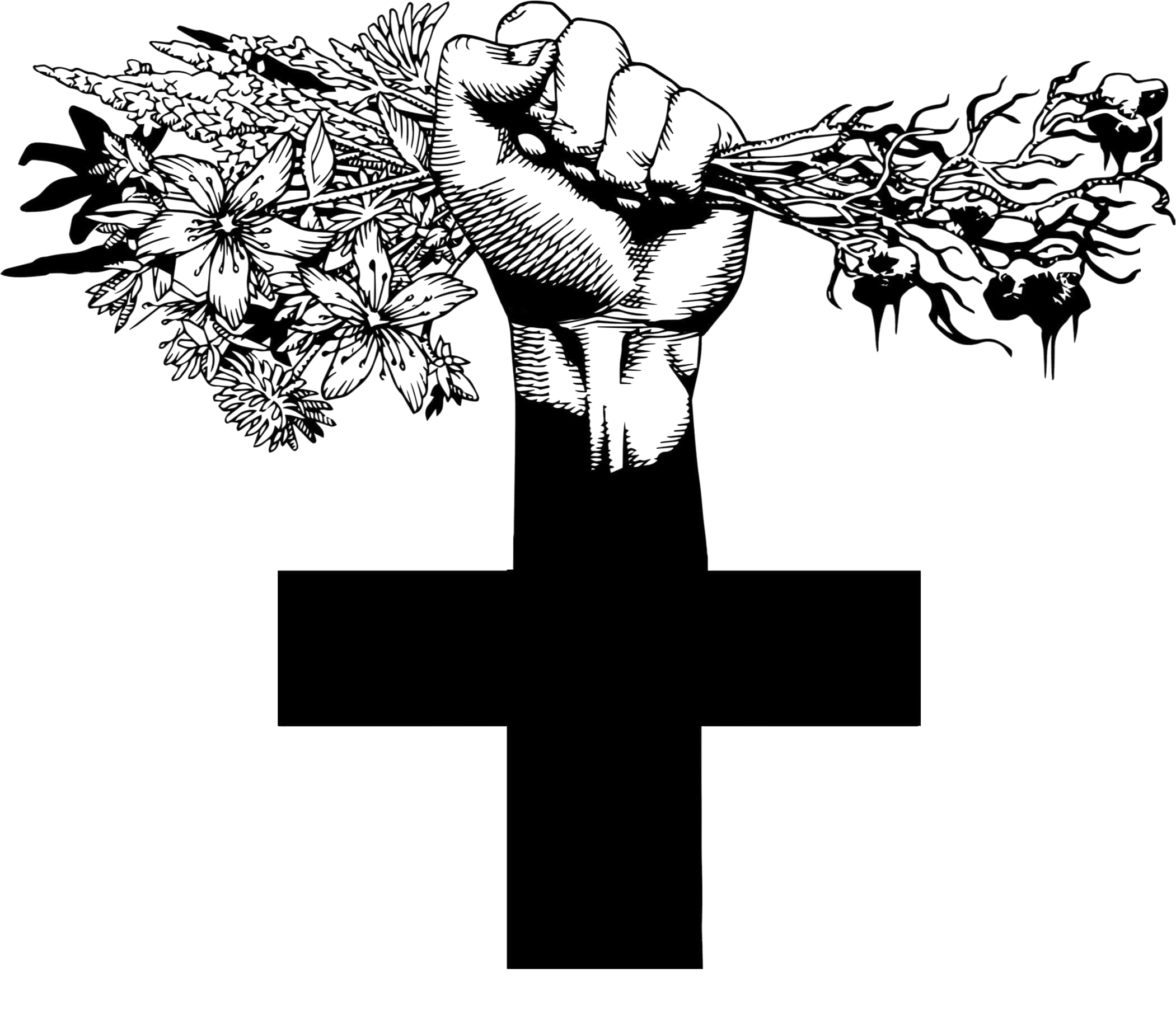
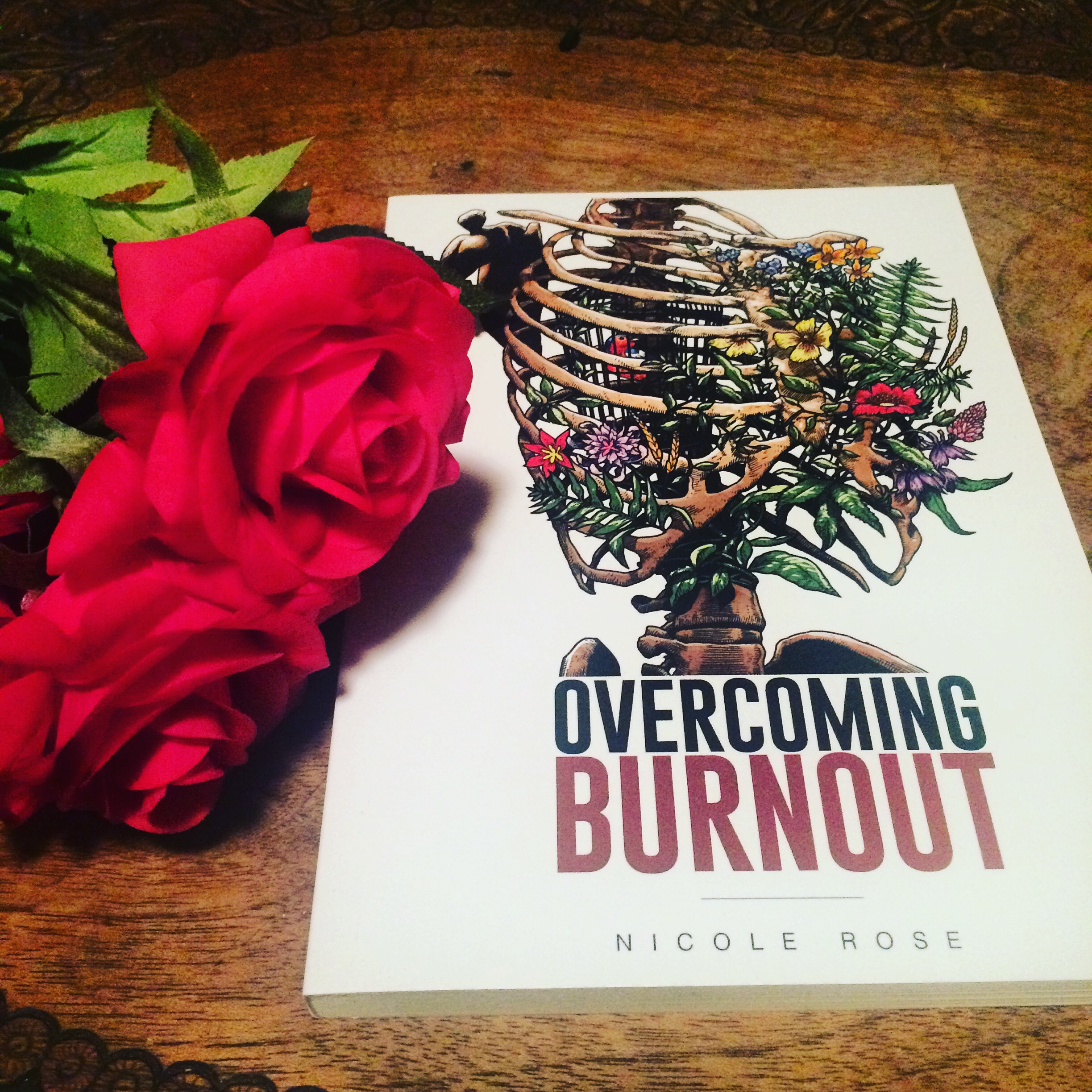

What this Course is and isn't
As someone who has lived with PTSD, I’ve had those moments of absolute despair where I’m prepared to spend everything I have in order to feel some kind of relief. Where I’ve gone into debt investing in online programs, ‘rapid therapies’ or whatever is on offer because I’m literally so f**king desperate to feel different. It would break my heart to know that people paid for this program under any kind of false premises so I wanted to make it explicit what the course can and cannot offer. It’s the worst of capitalist marketing tactics when online courses and coaches promise the world for only $$$. I'm not prepared to exploit, deceive or manipulate anyone!
This program is not ‘the single solution’. You’re not going to work through videos and suddenly be free from PTSD. As we explore in the course, our bodies are unique, we experience distress in different ways and it can often take a whole ecosystem of support to feel differently - for example, therapy, dietary changes, herbal support, embodied practices, friendships, political organising etc. This course is not a replacement for therapy or any other trauma recovery modality and approach. Likewise, this course does not offer you a qualification that enables you to work as a herbalist or trauma professional - but it will certainly compliment any course of study that you are undertaking.
I share this knowledge within my scope of practice - a clinical herbalist. I’m not a therapist. I have not had the financial resources to complete lengthy qualifications in trauma recovery, but I have undertaken thousands of hours of self-education in trying to understand how trauma shapes the body. Through the course, I give detailed references and links to resources from trauma professionals with many letters after their names.
My knowledge is learnt and embodied through life experience ‘in the trenches’. In prison, I worked as a listener with the Samaritans. This involved spending sometimes thirty or more hours a week listening to suicidal and deeply distressed women disclose horrific stories. I’ve supported people in prison for nearly twenty years pushed to the limits of what humans can endure. I’ve worked with thousands of refugees in a mobile herbal clinic and supported many people fleeing the invasion of Ukraine with herbal medicine. I’ve supported people experiencing repression, and gifted medicine to their families destroyed by grief. I’ve worked with people trying to heal from prison, addiction and childhood trauma with herbal medicines to reclaim their sleep, find out what rest really means and slowly learn to inhabit what feels like a new body. I’ve seen plants work their magic over and over and over again, and it’s with this confidence that I feel able to offer this course.
So, what does this course offer? This course is an opportunity to increase, and deepen, your knowledge of plant medicines. It is an opportunity to transform the way you look at trauma. I believe plants can and do radically change people’s lives and can more often than not bring them into a world of pleasure and purpose, connection and healing. I know that herbs have direct effects on people’s bodies and have been used on every continent for thousands of years. In the words of Indigenous writer and scientist Robin Wall Kimmerer, “In some Native languages the term for plants translates to ‘those who take care of us.’” Plants take care of each other and their ecosystems, including taking care of us. They take care of us in prison courtyards and refugee camps, when fleeing war zones or working toward a world free of domination, exploitation, and oppression. Plants take care of us until all are free. I hope they can take care of you too.
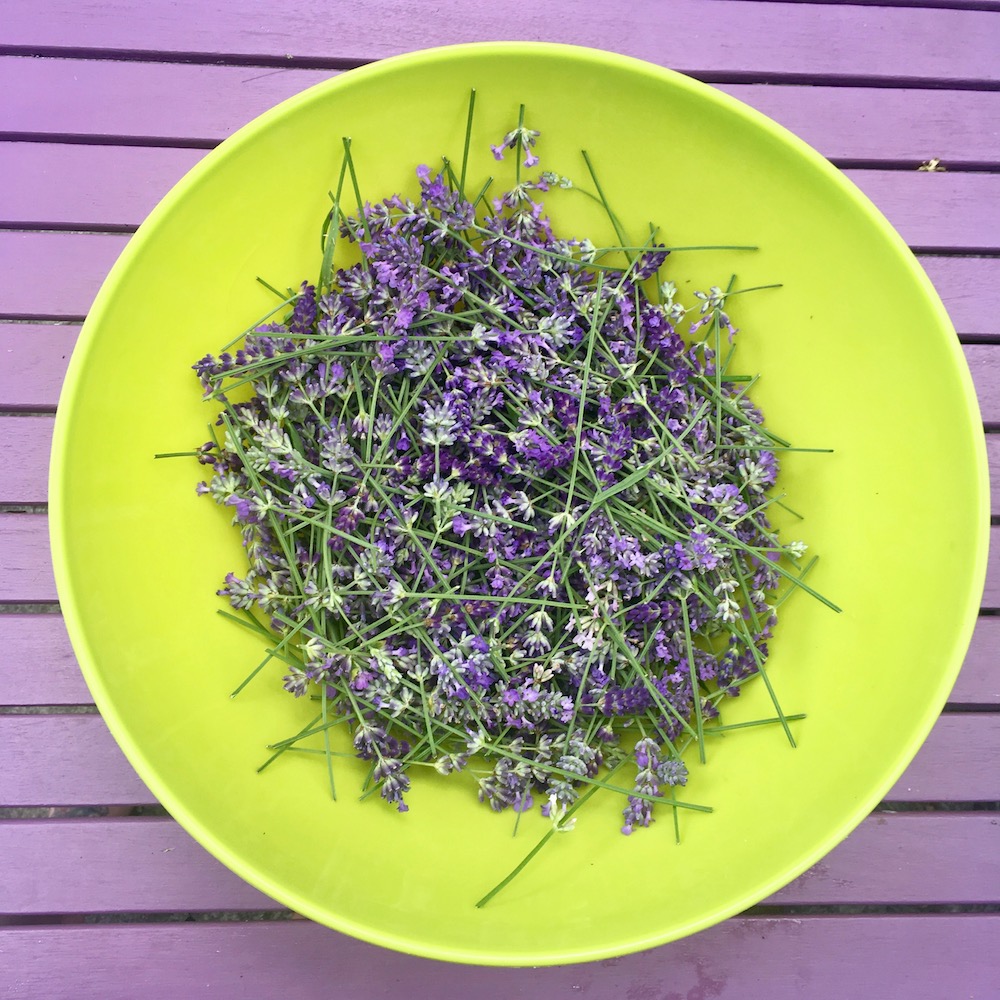
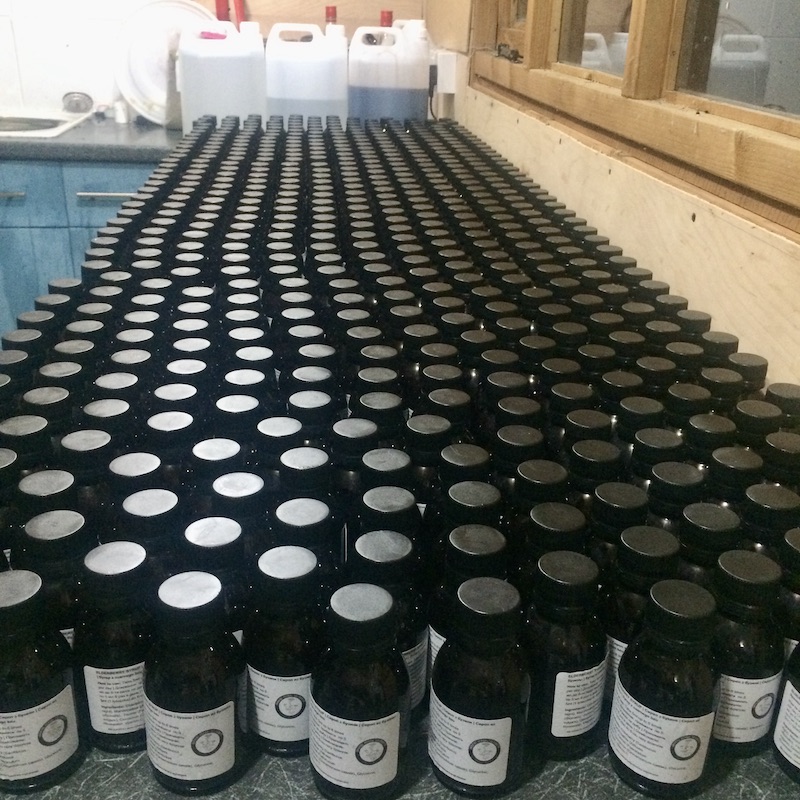
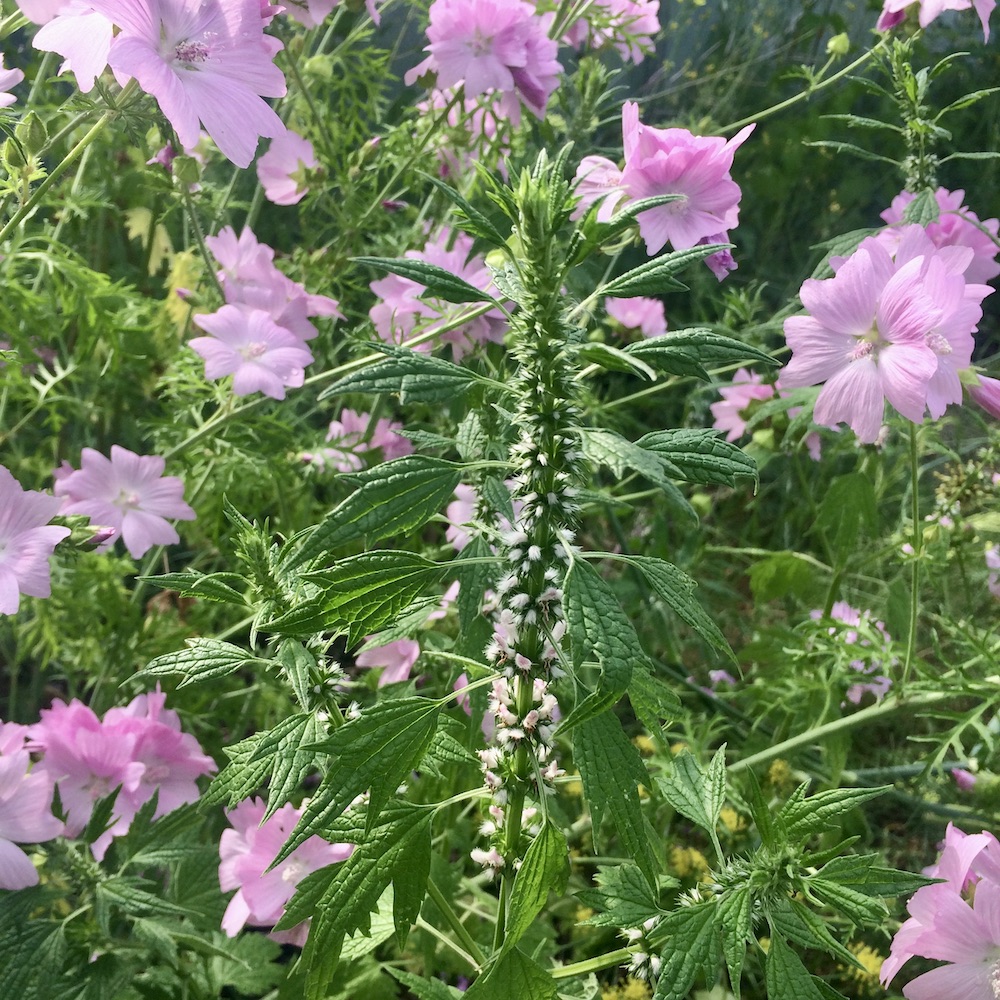
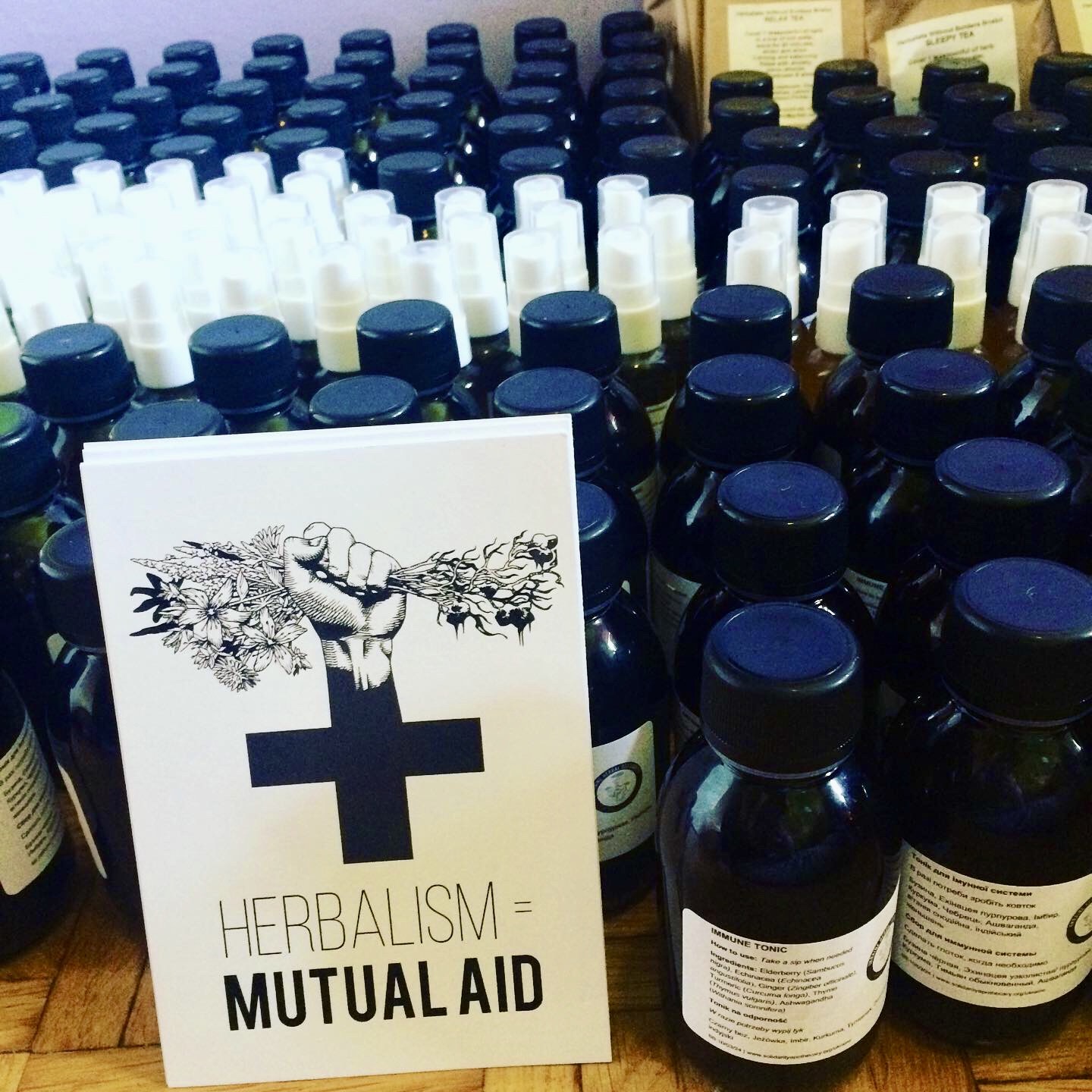
Commonly Asked Questions
How much does the course cost?
The course is offered on a sliding scale. There are more details about this in the ‘How much does the course cost?’ section towards the end of the page (after About Nicole and the Solidarity Apothecary).Can I get a refund if I'm unhappy?
I strongly encourage you to read through this course page in its entirety and make an informed decision about if the course is right for you at this moment in time. As an undercapitalised femme with limited financial resources, requests for refunds have a big impact. However, if you are unsatisfied with your purchase, contact me within the first fourteen days and I will give you a full refund.How long will I have access to this course?
Indefinitely! You will have lifetime access.When does the course start and finish?
The course is open for enrollment at different times of the year. This is because I want to ensure I am present and available for questions and admin when people are signing up and getting started. Other months it could be that I’m working with the mobile clinic in Calais or engaged in other frontline herbalism work.I don't have PTSD, can I still do this course?
Yes! All of the herbs introduced in this course are helpful with the inevitable stresses of life. One of the goals of the course is to support you to build a medicine cabinet of allies that can aid you in navigating a lifetime of experiences. There is also a huge amount of learning embedded in the course that is useful to anyone interested in herbal medicine e.g. medicine making, herbal safety, constitutions, energetics and tissue states and more.I'm just starting to learn about herbalism, is this course for me?
Yes! Everything is built up in layers; introducing and re-visiting concepts and ideas over time. A comprehensive glossary is shared to counter the risk of any assumed knowledge. I’ve tried to create it in a ‘plain speak’ way as possible. For people at the start of their herbalism learning journey, I think the course will accelerate you in a great direction. It brings together everything I’ve gathered in 15+ years of education and experimentation. I wish I had this resource when I was starting out!I'm an experienced herbalist, is this course for me?
Yes! From my experience, many herbalists still speak about trauma in a limited framework, if they even talk about it at all. I feel it's essential that all experienced or practising herbalists deepen their understanding of trauma because it so dramatically affects people’s lives and their health. I think exploring more liberating ways of understanding trauma can benefit everybody. In terms of herbalism, some aspects will be familiar, but it’s unlikely that this knowledge has been brought together in such a focused way around trauma and the nervous system. The nervine deep dive is really that - it’s an exploration in depth about plants and their impacts on the nervous system. I share a lot of insight into these actions in practice and the complexities of where they are strongly indicated and when they may not be appropriate or preferred.What support is available?
I am available to answer questions over email. The logistics of this will be introduced in the welcome lessons of the course.Can’t I just find this information in a book?
You can definitely try it! I’ve spent 15+ years scavenging every possible resource on this subject to try and fit the pieces of the puzzle together. There are many fantastic books on herbalism, likewise, there are many interesting and well-researched books about trauma, PTSD and traumatic stress. I don’t believe there are many or any that bring them together while also having a structural anti-oppression analysis. This is sadly the main thing left out of books on trauma which still centre experiences on the individual and their physiology, rather than the traumatising forces in the world that shape our daily lives.if I don't enrol now, when is the course next available?
March/April 2025. Please join my newsletter list to receive any announcements!What others have said about the course
"This course was incredible. I learned sooo much about myself & my brain (despite having PTSD my *entire life*, and being in therapy on and off for decades) as well as I did herbalism and supporting all the folks like me. Nicole has written a love letter to the suffering, and covered it in rose petals. I cannot recommend it enough."
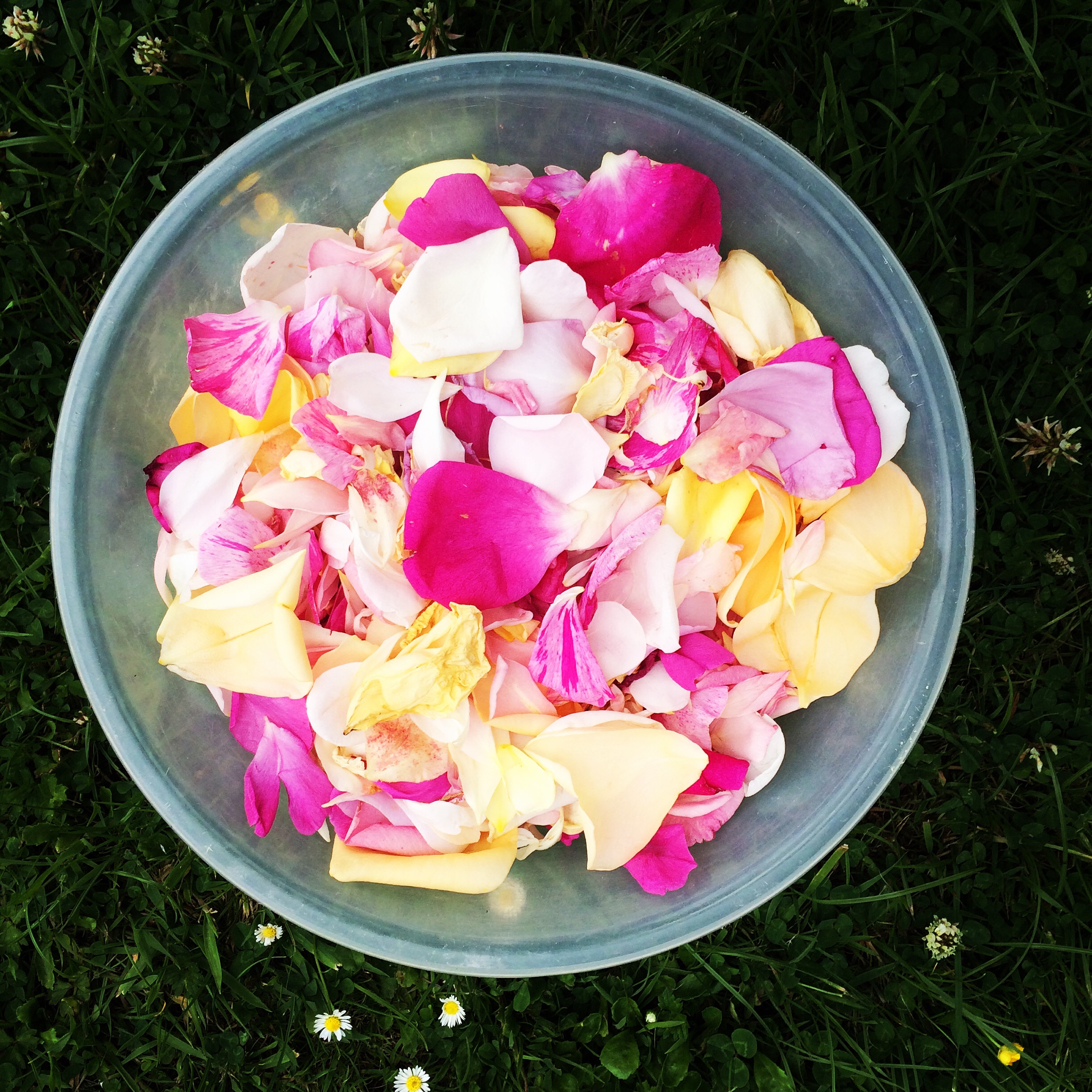 AshCEO
AshCEO"I wanted to thank Nicole for this absolutely amazing course and space. I was first introduced to her work via a podcast with Propaganda by The Seed and since have printed the Prisoner's Herbal, listened to her podcast, done the Glycerite course, and now the Herbalism, PTSD & Traumatic Stress Course.
What keeps me coming back is how much care and intention is put into each project she creates. I was looking for a space to deep dive into Herbalism without the toxicity of institutions or traditional learning spaces; Nicole provided exactly what I was looking for. I have filled a whole notebook with information and resources that I continuously come back to. I appreciate the balance of her being extremely detailed with the content while also always trying her best to keep every course as accessible and approachable as possible. I would recommend this course or any other one to any one of my friends looking to engage with plants and how we can work with them."
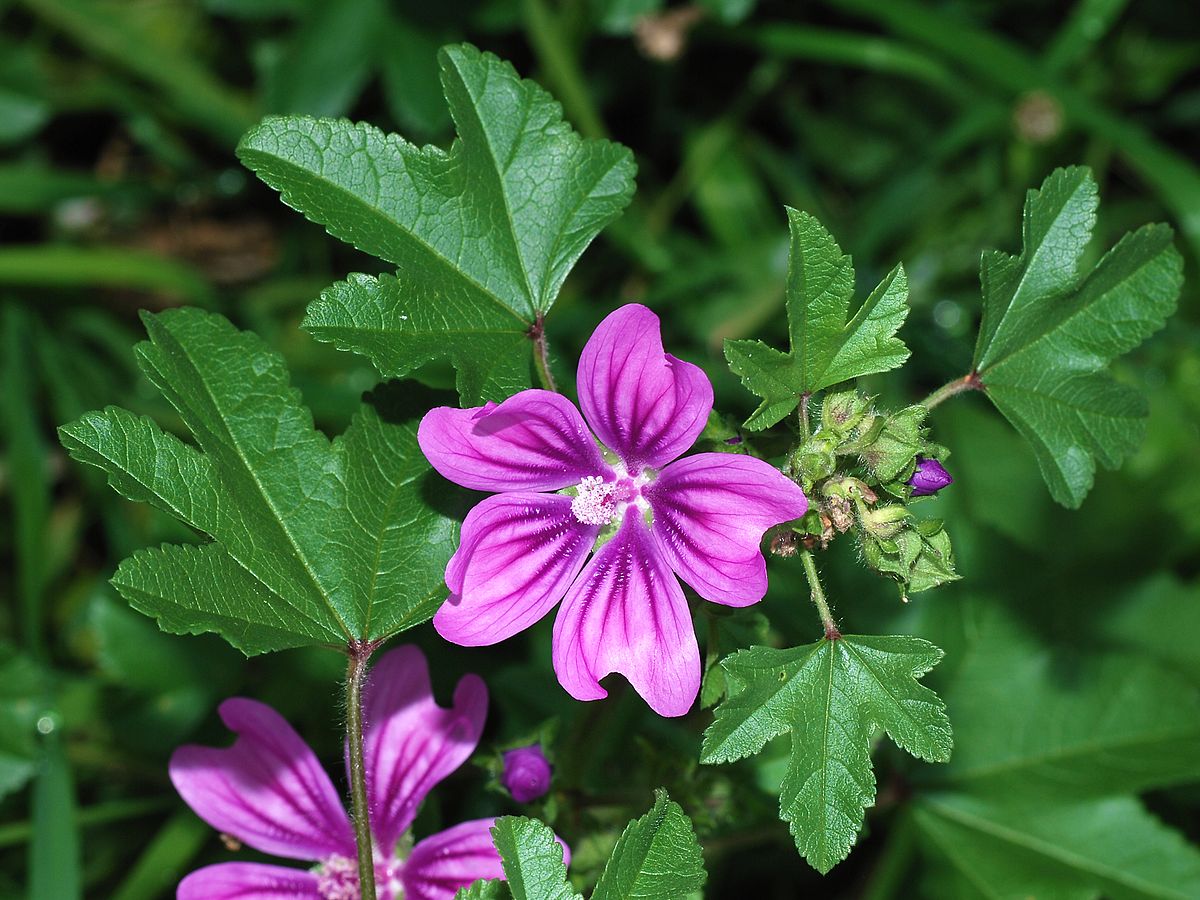 Peach CEO
Peach CEO"I'd been studying herbalism for quite a while when I came across Nicole's course 'Herbalism, PTSD, and Traumatic Stress' - I can say without a doubt that she delivers a ton of helpful content, and honestly can feel the energy she poured into creating this. I have learned a lot, and with the many resources she provides, I know this information will be helpful to the clients I work with and myself.
I highly recommend the Herbalism, PTSD, and Traumatic Stress Course to anyone wanting to explore this topic."
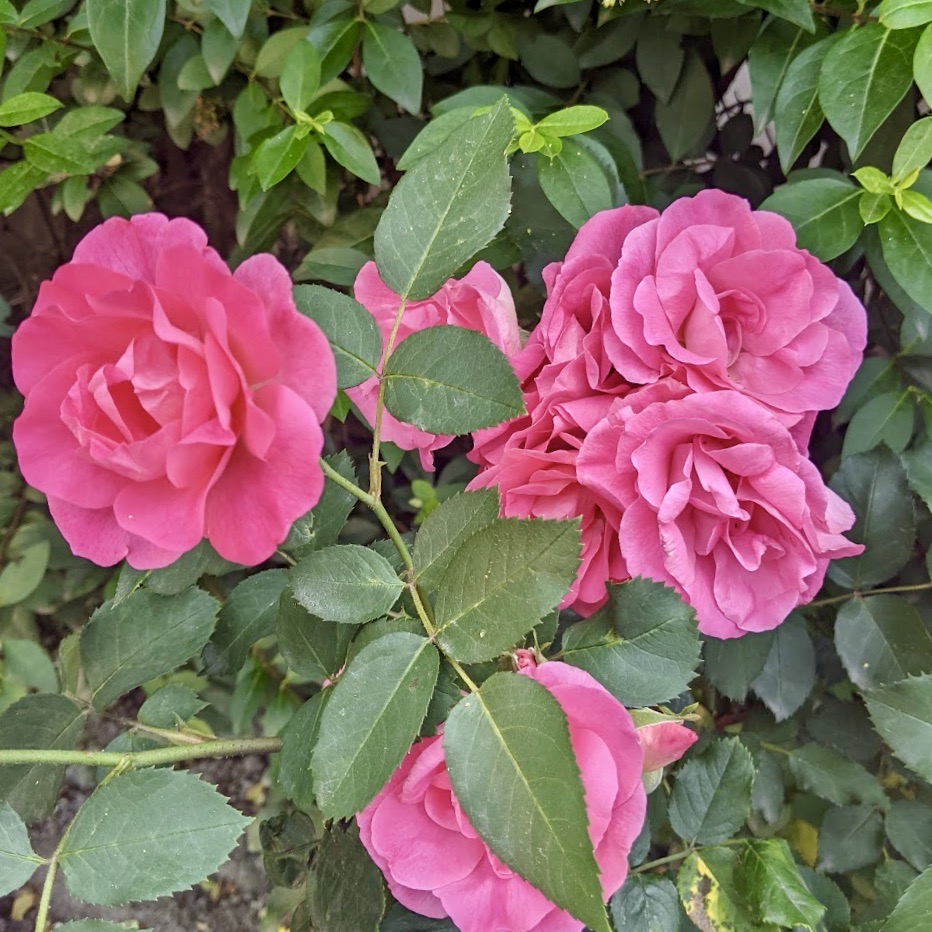 Michelle SpaldingCEO
Michelle SpaldingCEO"This course was so helpful to me both as someone studying herbalism and personally. Nicole has such a lovely jargon free way of explaining things, there are some concepts of both herbalism and the way 0ur bodies work that I have never been able to get to grips with before that were made clear to me with this course. I really appreciate the way Nicole takes time to acknowledge different peoples experiences, include trigger warnings and acknowledgements when speaking on herbs that don't come from her lineage - which can be rare in the herbalism world.
I really recommend this course to anyone working with patients in any holistic therapy role as well as anyone looking for ways to support themselves with their own trauma."
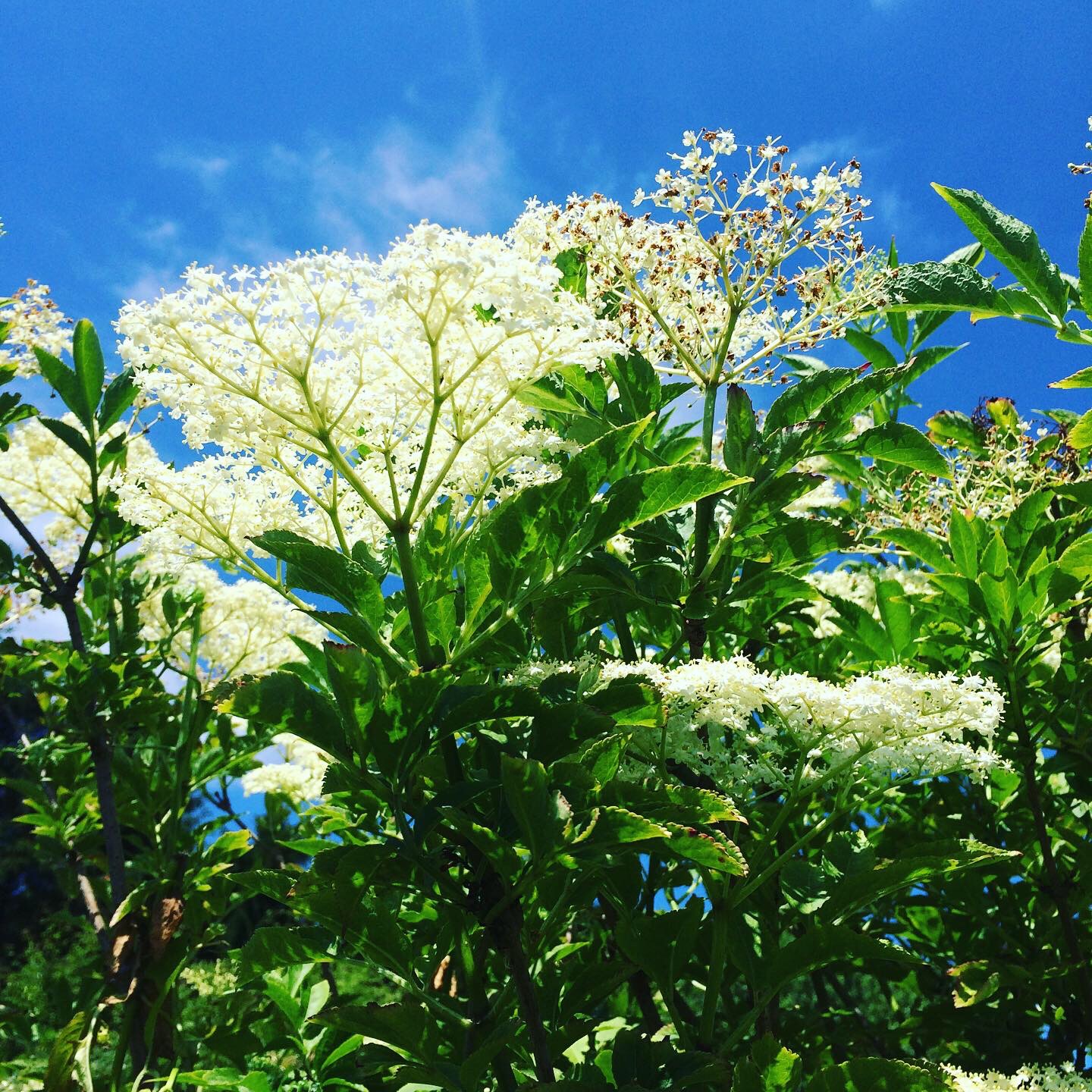 EllieCEO
EllieCEO"There are courses you know you need to take and this is one of those. As someone with PTSD & someone who looks to help people move through pain, I found this course invaluable. It has given me new ways to explore my herby friends!"
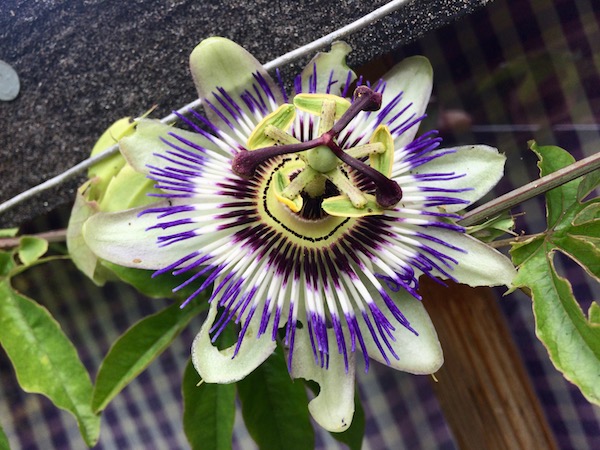 Juaniehttps://www.hiddenhollowholistics.com
Juaniehttps://www.hiddenhollowholistics.com"This course has been really important and empowering for me. Learning about trauma and how to work with nervines had changed a lot in how I understand myself and the people around me on daily basis. It is a journey that already brought me so much. As a person with ADHD this worked perfect for me, being able to choose my own moments to learn while knowing I can always send an email if something is unclear! I would recommend this course!!"
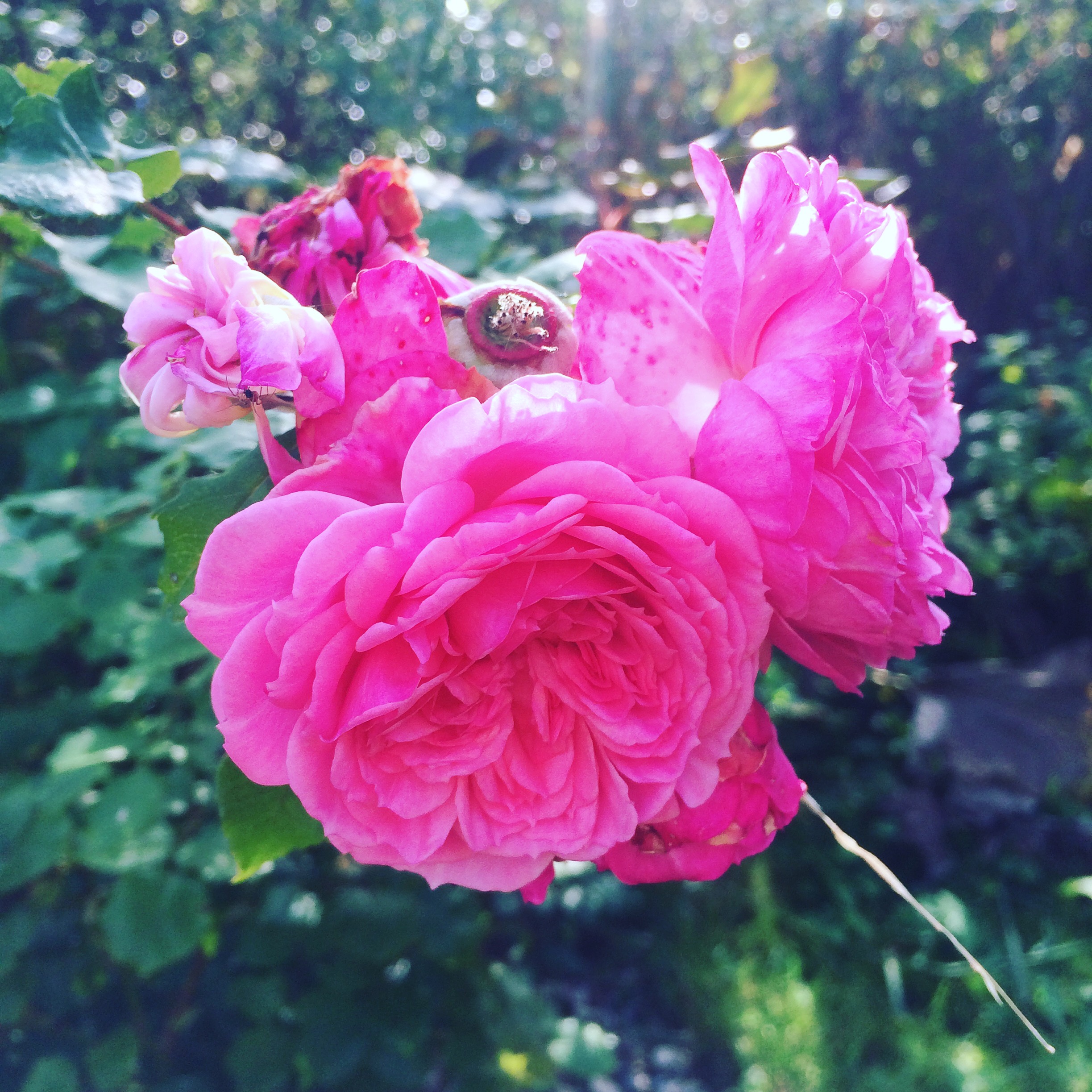 Lex Adriaensen CEO
Lex Adriaensen CEO"There are courses you know you need to take and this is one of those. As someone with PTSD & someone who looks to help people move through pain, I found this course invaluable. It has given me new ways to explore my herby friends!"
 Juanie https://www.hiddenhollowholistics.com
Juanie https://www.hiddenhollowholistics.com"I'm finding the course both fascinating and confronting. It's perfect. Thanks for putting together such an epic piece of herbal teaching."
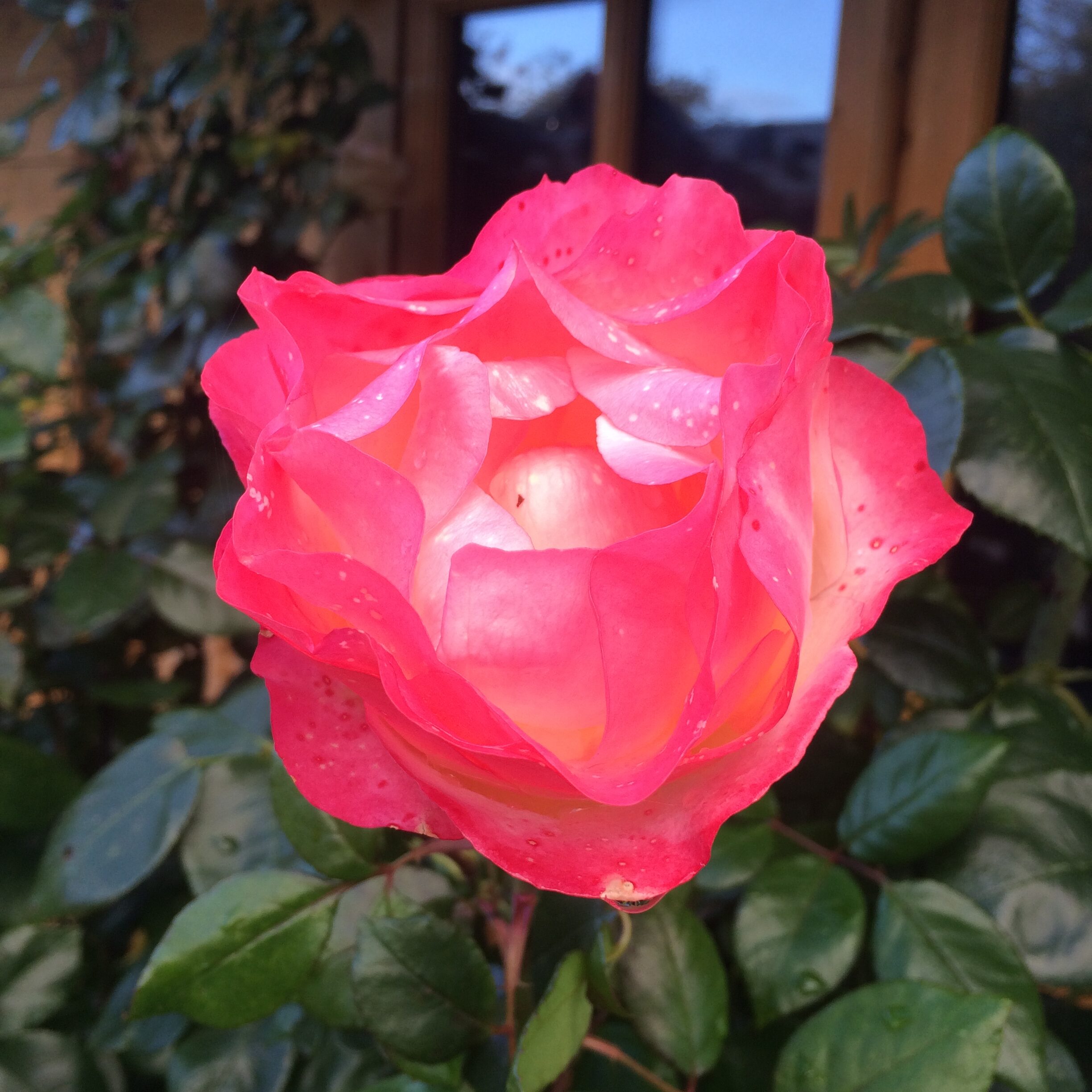 MalcolmCEO
MalcolmCEO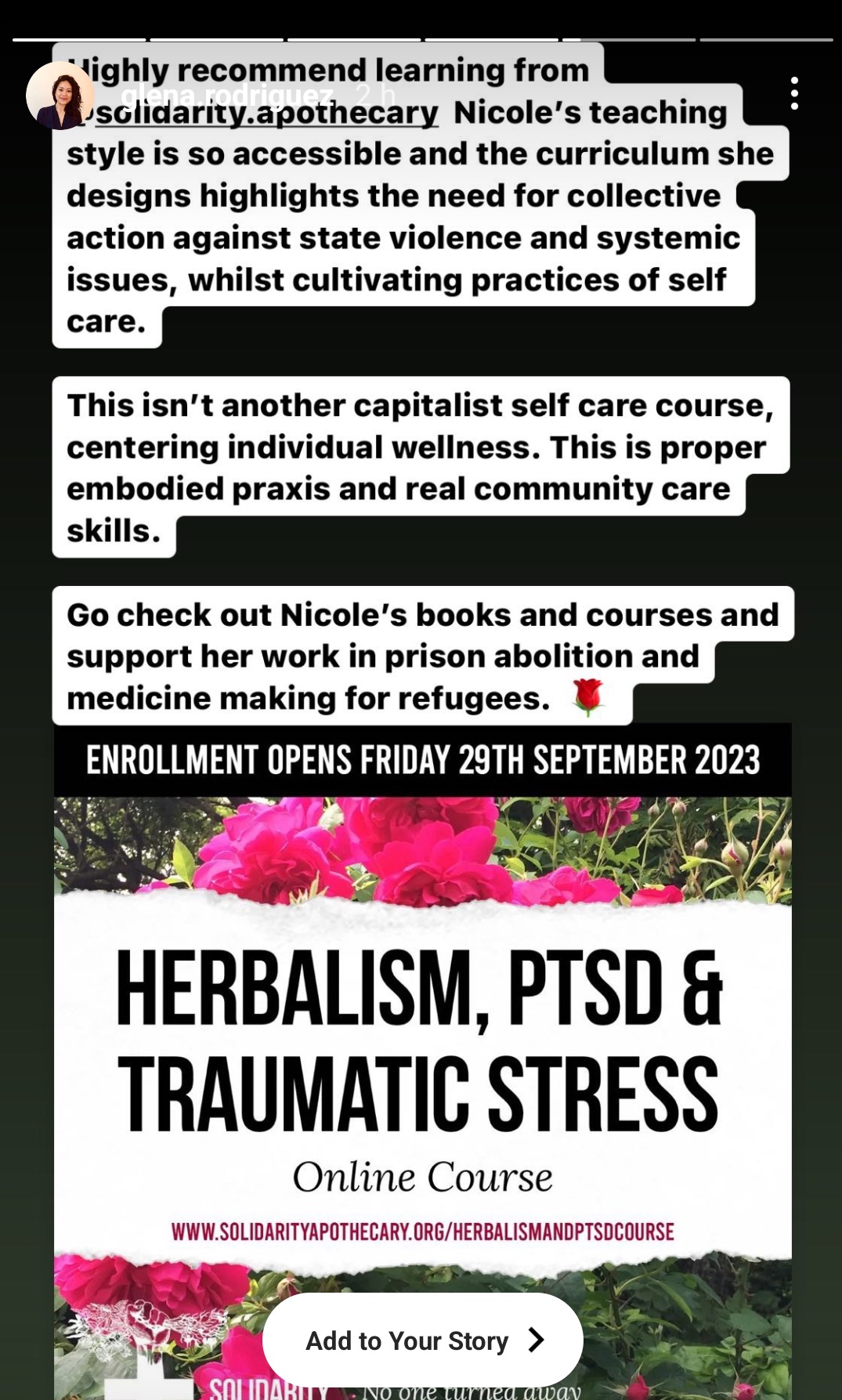
"I'm only part way through this course, but so far it has been good. I appreciate how Nicole has pulled together the information about how trauma affects our bodies and the emphasis she places on how we can do something to help ourselves instead of merely being trapped in the disaster that's left behind. Her suggestions of how to connect with plants are inspiring!"
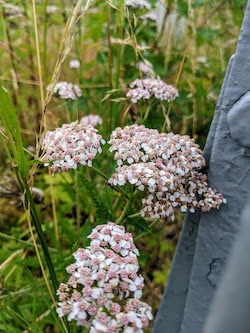 LarissaCEO
LarissaCEO"I signed up for this course because I work with people who are unhoused, underhoused, or in vulnerable situations and I couldn't find any information on how to approach care from a herbalist perspective. I have been following Nicole's work for years, she is my go to for anything relating to plant medicine. Her years of experience and intersectional approach make her perspective very unique. The language is always very accessible and I appreciate the ability to take her courses at my own pace.
I would highly recommend this course for anyone interested in community, care, intersectionality, and herbalism. I learn so much from every sentence Nicole writes."
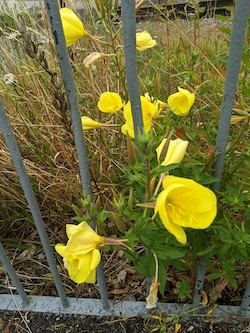 IsaCEO
IsaCEO"The Herbalism and PTSD course has really broadened and deepened my knowledge of herbs and herbalism. I was only anticipating to learn about specific herbs that help with trauma but Nicole goes far beyond just that, sharing tons of knowledge such as about how herbs interact with bodies differently through tissue states, and much more. If, like me, you've dabbled in making tinctures for yourself but want to go deeper in a thorough, comprehensive but manageable way, this is a great course to do that!"
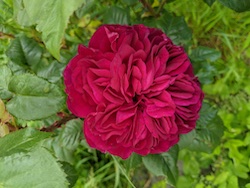 Emily WCEO
Emily WCEO"I signed up to the Herbalism, PTSD & Traumatic Stress course because I had been let down so many times by mental health services in my area, and I wanted to take control of my ‘recovery’.
What’s amazing about the course is that you can do it in your own time - I was able to put it down when I had a period of very bad mental health, and pick it back up again when I was ready.
The course has also helped me get a better understanding of political and societal structures feed into and interact with trauma. It’s helped me feel more connected to the world around me and given me purpose as I have started engaging deeper with abolitionist movements.
Herbalism is something I grew up with but had never explored the intricacies of it. Science was never my strong suit, but the course makes complex topics really easy to understand. My new plant knowledge has helped me feel closer to the land and the plants that grow around me. I have made a Hawthorn tincture using the directions from the course, and it really helps me when I am feeling anxious. It’s so empowering to be able to make medicine for myself, and for it to work. I feel like I finally have control over my body and have the power to help myself, rather than having to rely on others.
I would absolutely recommend this course to anyone who wants to learn more about how herbalism can support you if you’ve experienced trauma, but also for anyone who wants to understand how society in the so-called West wasn’t built to benefit traumatised people."
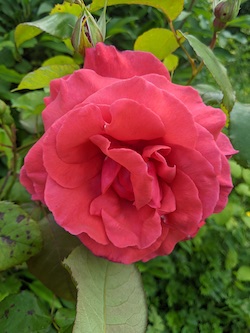 LucyCEO
LucyCEO"Being part of the Herbalism, PTSD and Traumatic Stress course was incredibly empowering and inspiring for me; it helped give me confidence and motivation to make remedies for my own day to day (and night!) challenges. I cannot recommend the course enough, for those new or experienced, giving students a positive rooting in the political framing of stress and trauma. Thank you so much for making this course accessible for learning, and also financially."
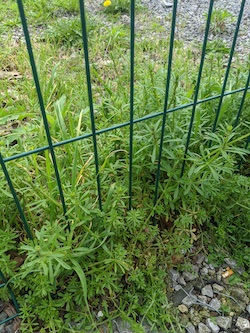 JKCEO
JKCEO"First of all thank you for this course, it profoundly inspired me.
I had quite some knowledge on herbalism - that I have acquired through other courses and mostly on "the field" while living in ZADs and rural squats. I struggled a lot in the past to bring a political dimension into the world of herbal medicine as everywhere around me this practice seemed associated with white middle class people or new age tendencies - which I cannot stand. Through your course I finally acquired some tools to better argue that herbalism is political and that plants can be political badass allies!
For what concern the part more specifically linked with trauma, ptsd, and its manifestations in the body, I have to say that I have learned tons ! I have never had courses about such topics even though I am quite familiar with them through personal experience and as I evolve in queer, anarchist, anti-psychiatric places where trauma is very present. It still felt a bit superficial, like the tip of the iceberg. Perhaps I would have appreciated more space given to childhood trauma and to more complex trauma dynamics - as these are so present around me. But overall it was a great introduction on the subject.
The second part talking more in depth about herbalism was also a very nice introduction. I love the diy vibe as I think it gives power back to people and so yeah if you want to make a tincture you can just fill a jar with plants and cover it with alcohol ! I love that most of the plants you mention grow wildly in western europe where your lineages are from. This said quite some plants don't wildly grow there and so it was a bit frustrating to learn in depth about plants when you don't have the privilege to grow them/buy them. I think I would have stuck to wild plants only. Maybe a bit more space could have been given to the appropriate doses for each plant in all its possible forms.
Another tiny note is about the fact that the glycerine we buy is produced by a deadly industrial complex, this is something people should be aware of. However, it is possible to make your own glycerine (!!), I would have loved a small explanation about this or at least a link - perhaps you mention it in your other course about glycerine medicine but I have not taken it.
That's all for the critiques. I adored this course and I encourage everyone who is touched and/or interested by these subjects to take it. I honestly was sad when the course ended as it inspired me to know even more! Thank you infinitely for having shared your knowledge and experience, it inspired me to do the same.
Love and anarchism <3"
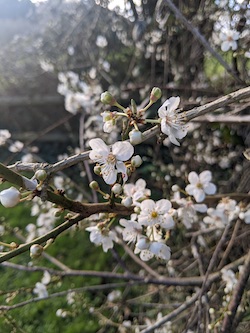 solCEO
solCEO"I signed up for the course after a bad breakup turned my life upside down and a series of unfortunate events brought me to my knees. The level of stress I was under was so great that my periods stopped and my mood was so low that I felt suicidal. I couldn't afford to pay full price for the course and so was overjoyed to be offered it at an affordable price for my situation.
The material covered in the course is beautiful and a true lifeline out of the darkness. It is useful to people who have experienced a variety of hardships and traumatic experiences.
I have definitely not engaged as much as I could have done yet, but I have been really grateful knowing that the information is there in bite sized chunks as I have the time to go through it.
I would really recommend this course to people who are at a loss for how to begin to put the pieces of themselves back together in a kind, constructive and healing manner."
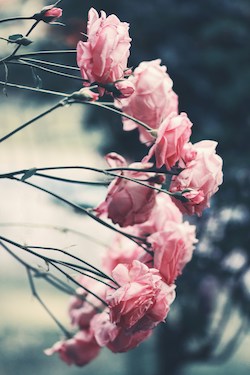 MeganCEO
MeganCEO"The Herbalism, PTSD & Traumatic Stress Course has become one of my most treasured resources as a therapist, spirit worker, and student of plant medicine. One of the most valuable aspects of the course is the way in which each module and segment acknowledges and addresses the political dimensions of trauma and intervention. The opening module about defining trauma should be required listening for anyone working with traumatized people and it has influenced and strengthened my work with my clients. This course is easy to follow, thoughtfully organized, and rooted in deep integrity and wisdom. It is also supporting me in my own healing, deepening my connection to my body, to plants, and to the joy of making my own medicine. Thank you, thank you, thank you for this course!"
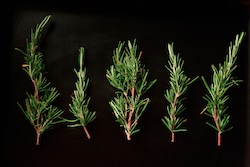 MalloryCEO
MalloryCEO"I am still working my way through the Herbalism, PTSD, & Traumatic Stress Course and I am so happy it was made accessible at a sliding scale price. Despite being a white cisgender woman, Nicole pays attention to decolonialism and their own privilege while also naming how their own intersections have impacted their work and their study of herbalism.
This course is at times difficult to work through because some of the content related to trauma is very personally impactful, but I am really enjoying it overall and taking my time (a very long time) to work through it.
Grateful this knowledge was shared and not gate kept."
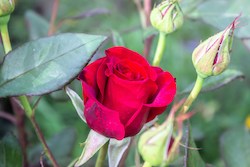 ZaniyaCEO
ZaniyaCEO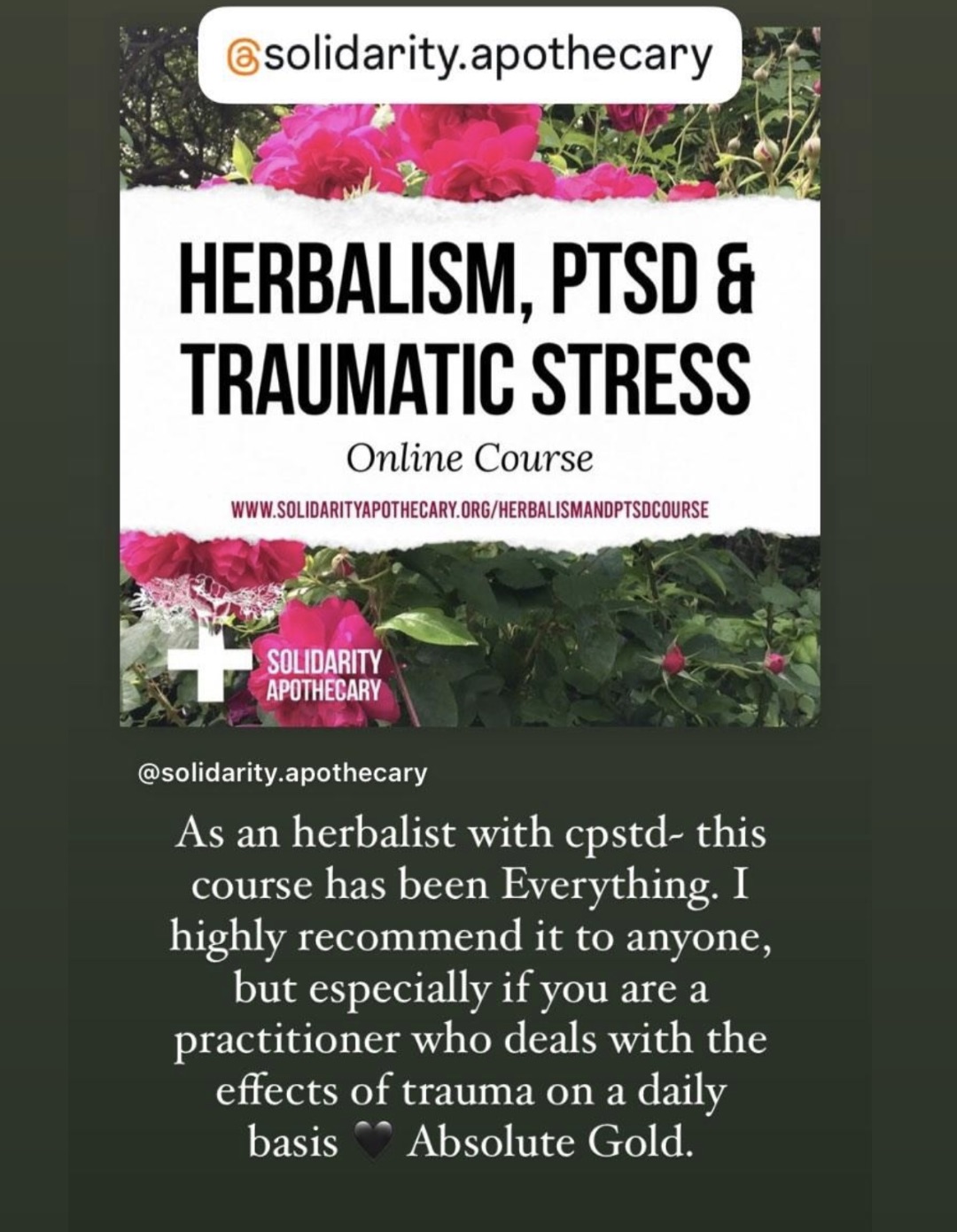
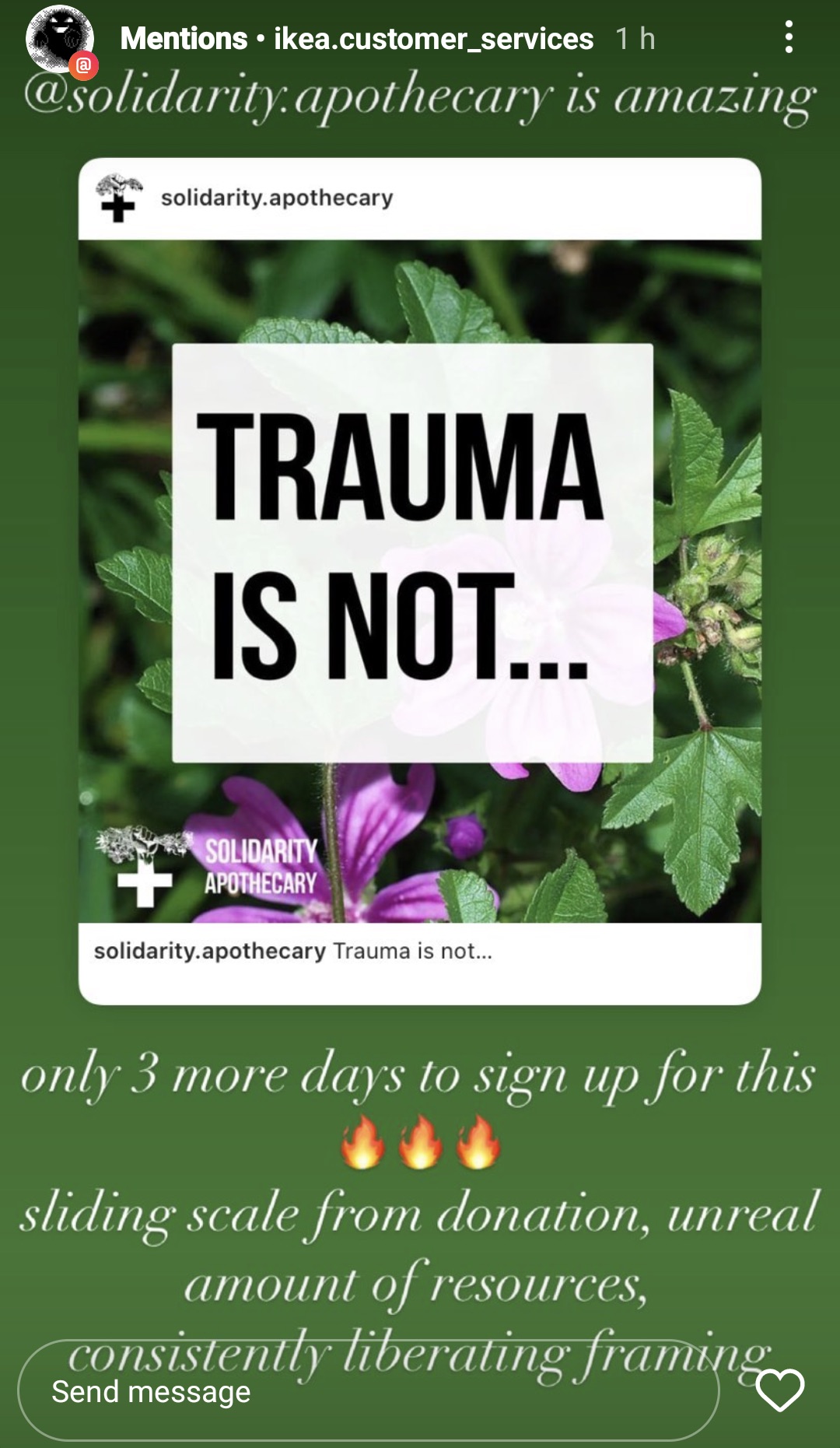
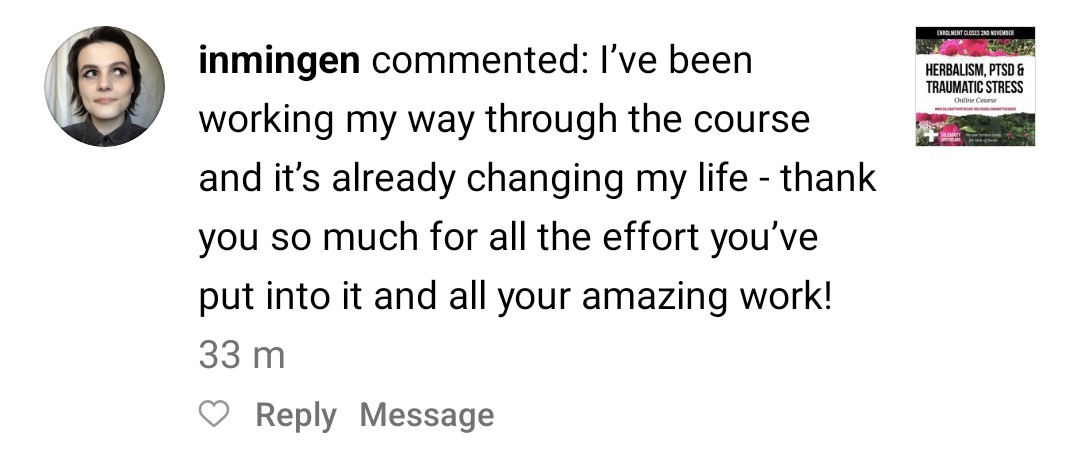
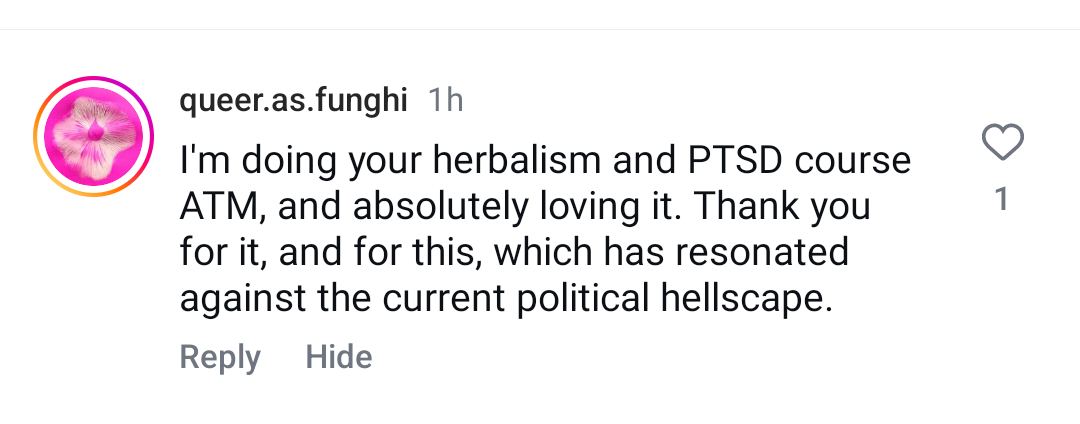
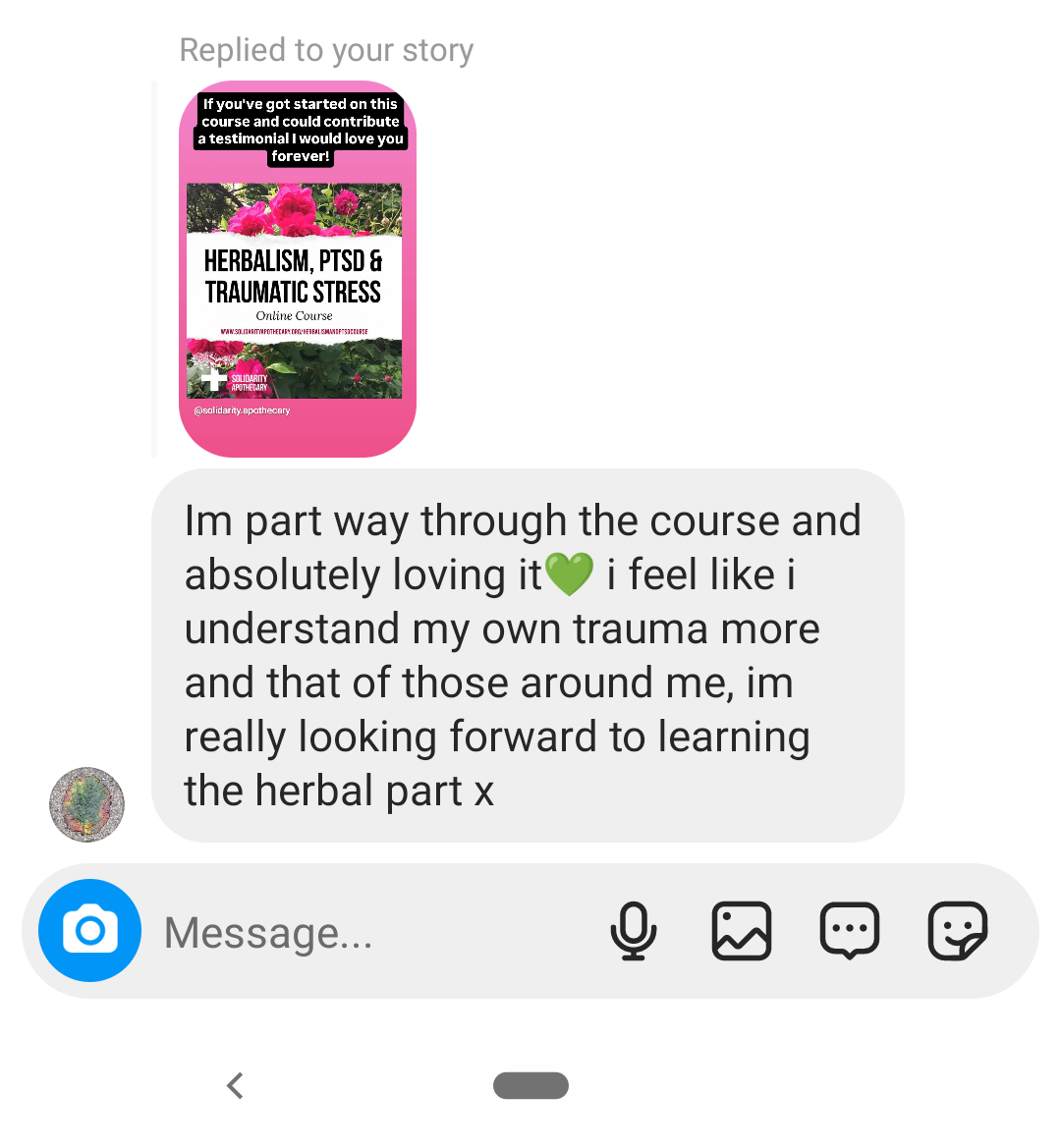
"The herbalism and PTSD course has really been an eye opening experience for me. Until I started this course, I didn't understand how most of the sources I'd read centred such a western perspective on trauma, and how problematic this is.
It has also been a vital resource for helping me understand the relationship between colonialism and psychiatry, and how current healing modalities do not serve working class people and anti capitalist struggles.
The way she approaches the herbalist aspects of the course, and her wider work, is inspiring and respectful of plants themselves, and the environments they are part of.
Since starting this course I have developed a deeper relationship with plants and my local habitat. I've also begun making my own medicine, and using them as a way of supporting my own health and wellbeing and my friends. I love that this course has an individual self care aspect to it, and offers this as a framework with which to approach herbalism.
I have found other courses to be out of my price range, the fact that Nicole offers this course at such a reduced rate is a gift!
I would encourage anyone who is interested in herbalism and trauma to do this course. It's been an inspiring and informative introduction for me. Thank you Nicole!"
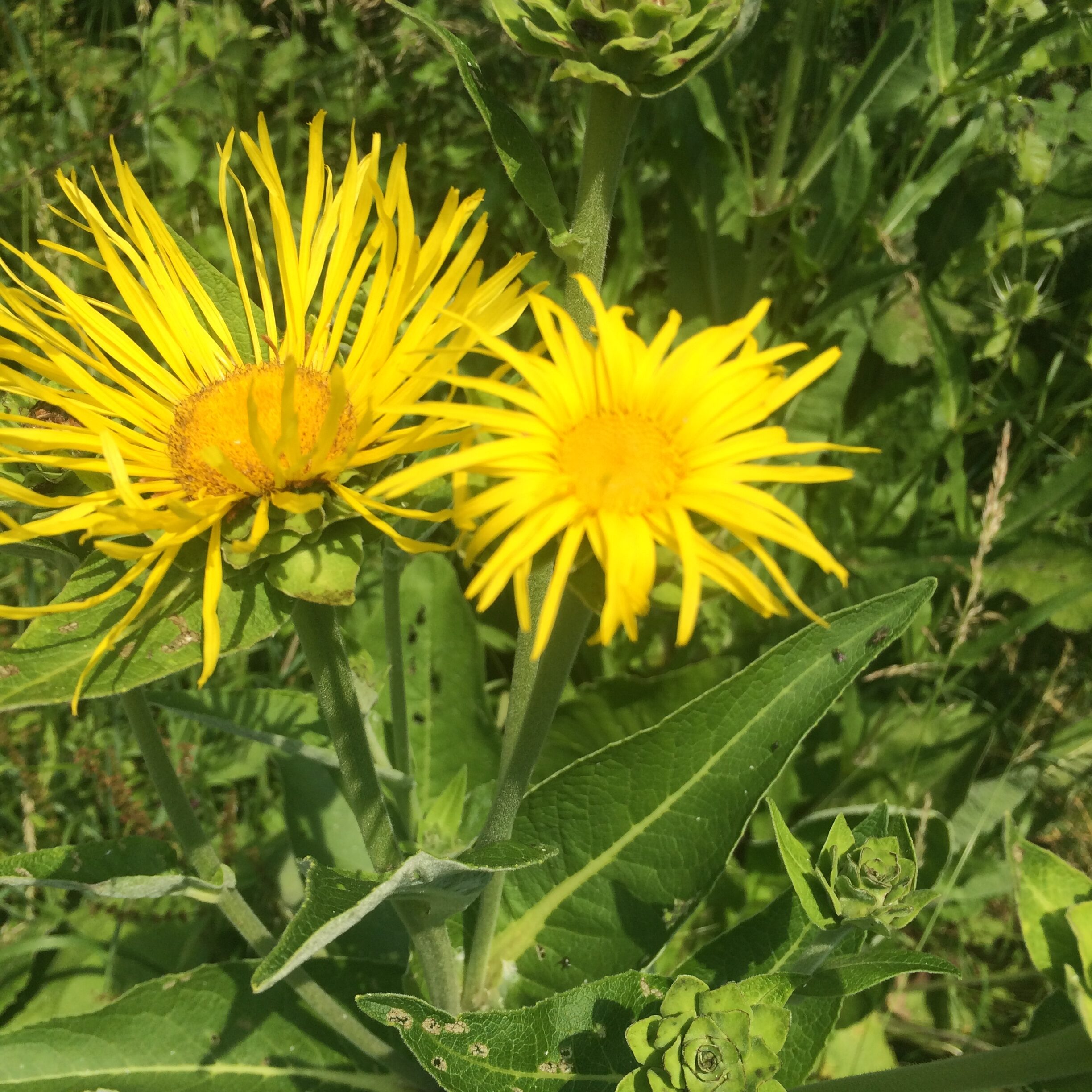 SophieCEO
SophieCEO"I enrolled in "Herbalism, PTSD and Traumatic Stress" from Solidarity Apothecary and have been absolutely blown away by this course. As an herbalist who themself has c-ptsd, I found the content to not only be invaluable as a clinician, but it has also been incredibly medicinal personally as well. Nicole has put together the information in such a conscientious way, with clear content warnings, and then so graciously and gently handles some of the most difficult subjects we face as humans with honesty, awareness and compassion. I have deeply appreciated her consistent de-centering and challenging of the traditional western perspectives that have been so loud and persistent in the mental health and wellness "field". Bravo!
The content is well-researched, with meticulous attention paid to siting and crediting sources. I love the variety of perspectives offered, from both their personal experiences and then the thoughts and voices of folks I had not yet had the privilege to know. I am also the biggest fan of sliding scale structures and have found this course to be one of the most accessible I have taken - from pricing, the graphics, right down to Nicole describing the memes and images used and offering places to break and 'catch one's breath'. I am very grateful to have stumbled upon Solidarity Apothecary and this course! Keep up the great work, Nicole - it is so desperately needed in the world! Thank you for being here."
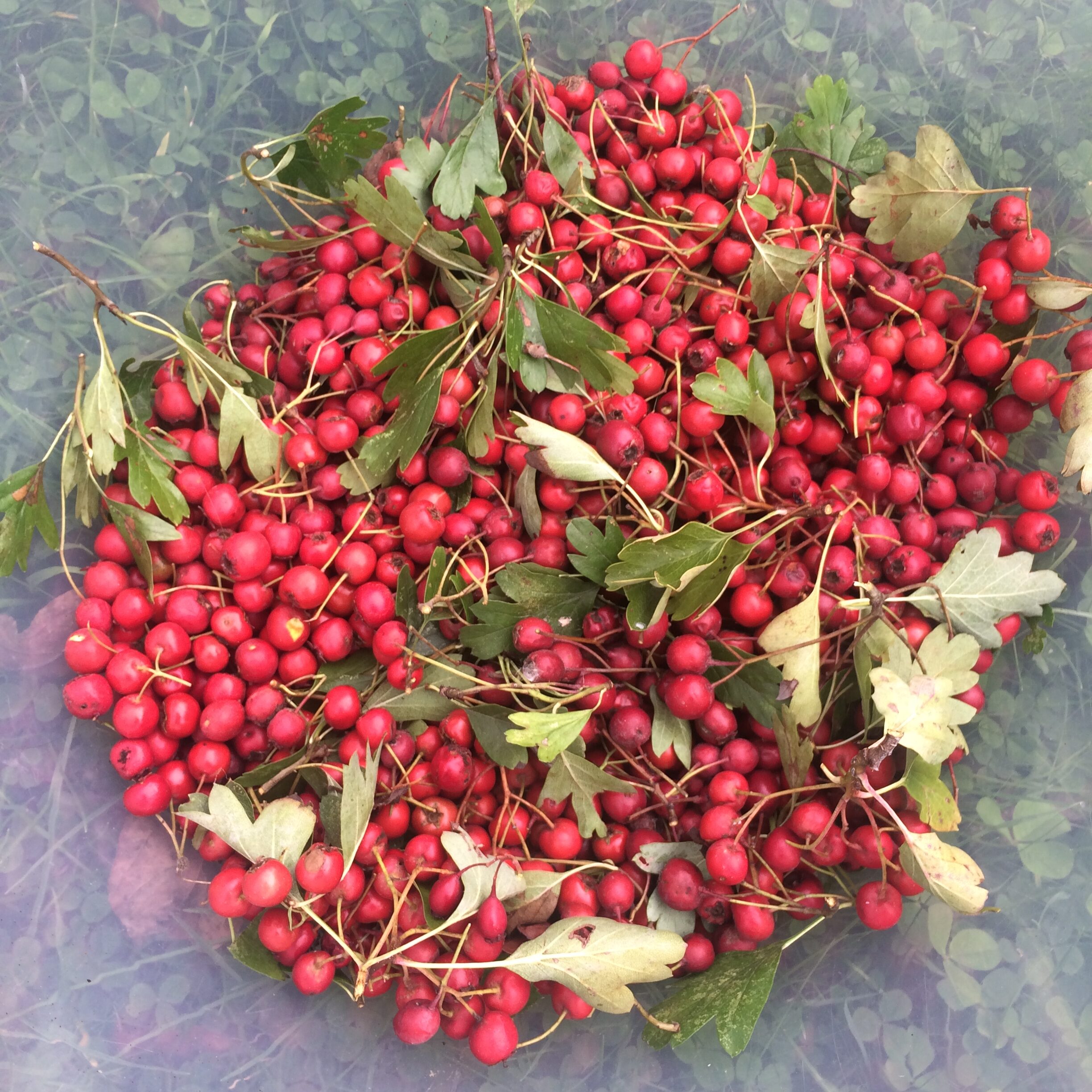 Andrea Webb CEO
Andrea Webb CEO"I am admittedly not all the way through it, but so far I love this course! It is very extensive and thorough and looks at a trauma from a different perspective. I have taken a few trauma informed classes and most just focus on individual trauma, I like how this class touches on shared traumas or collective traumas, looking at it from that lens is important and eye opening to the trauma some of my clients might experience and even trauma I didn't realize I shared. I am so happy I signed up and I know I will be using this information for years to come!"
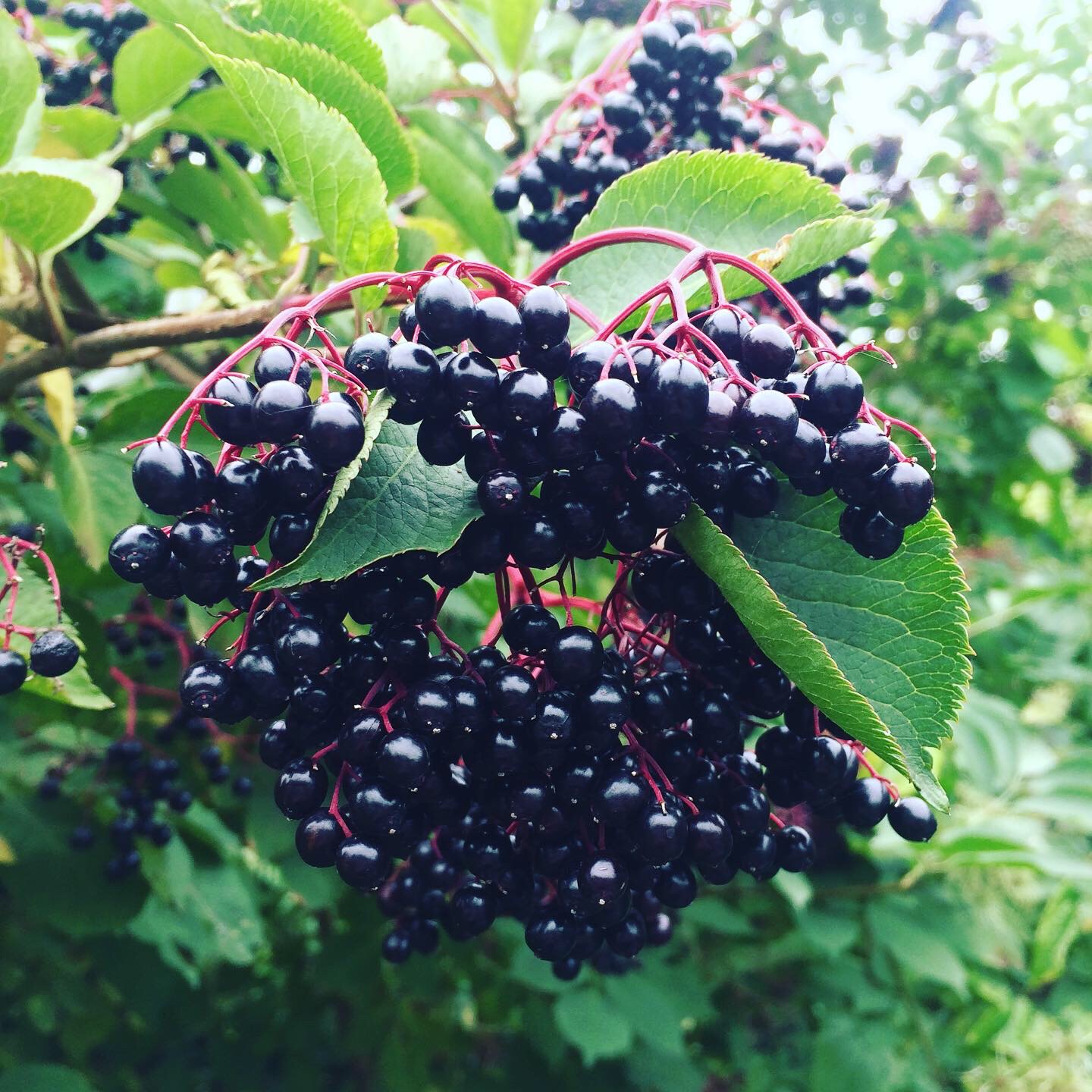 Alaura CEO
Alaura CEO"I’m currently taking your course and just wanted to express how grateful I am that you created it. I have been healing from what I now understand is full-blown PTSD, after leaving a lifetime of cycles of psychological and sexual abuse in various forms of intimate relationships.
I feel like if everyone better understood trauma frameworks and types, as well as how it impacts the mind, body, and spirit, there would be more empathy and solidarity in the world, and more united mobilization against capitalistic, colonial, and supremacist leaders and systems.
What you offer is truly a gift and anecdote to all this implosion, division, and polarization, where abuse is so prolific, constructive dialogue between groups is sparse, and traumatizing others is used as a means of control and domination (sorry I'm super pessimistic atm lol).
Looking forward to continuing learning, integrating, and healing myself and others. Also appreciate all the extra resources/materials to explore as well!
Just wanted to express my deep gratitude."
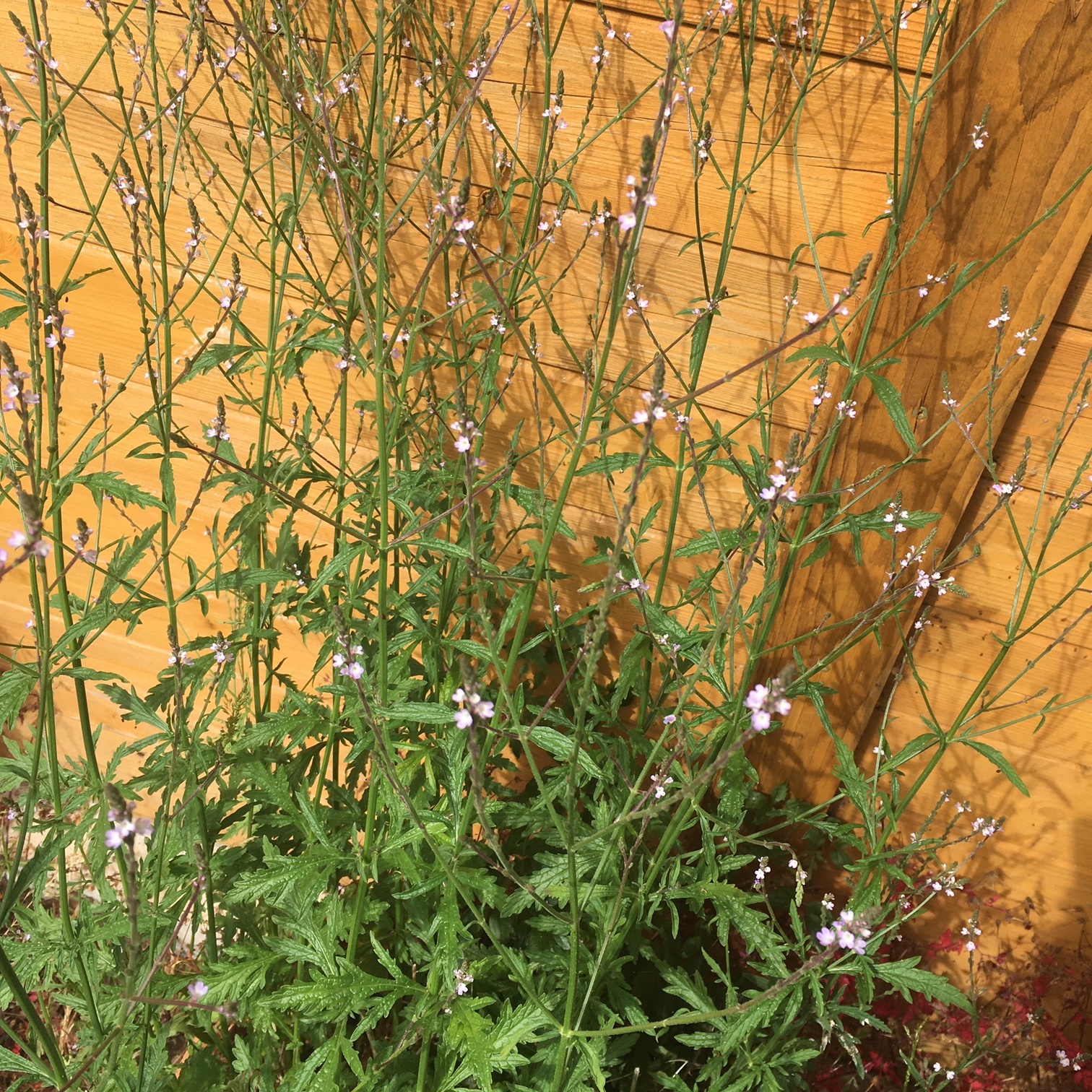 VCEO
VCEO

"In the '90s, I was a young animal liberation activist and that's when I first got into herbalism. It was older women environmentalists who introduced me to it. I stumbled upon Nicole's book "Overcoming Burnout" at a time when I really wanted to dive deeper into herbalism. I connected with her personal story and immediately signed up for her workshop. The course is great because it covers a wide range of topics and you can pick and choose what you want to learn. I've recently started a small urban garden, so I really loved the module on harvesting herbs and making medicines."
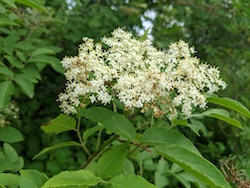 Nadia Di FioreCEO
Nadia Di FioreCEO"I've worked through some of the Herbalism PTSD & traumatic stress course, and plan to come back to it as soon as possible for a more hands-on experience as my situation allows. I think it is so beautiful how accessible this course is, both financially & content wise. As a disabled person I felt truly considered. I began the course when I was mostly bedbound, stuck in a small inaccessible top floor flat, yet still learned so much. The way I connected with plants was transformed when I did occasionally manage to get downstairs to the outside world, I could see all this new potential in our surrounding city streets! The Solidarity Apothecary mission is something I can wholeheartedly support, I can't recommend them highly enough. Herbalism used to feel like something so inaccessible to me, but now I can see how it can be within our reach even when it feels furthest away."
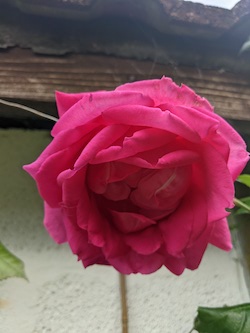 LisaCEO
LisaCEO"Beautiful, impactful and insightful - this is important work. So good I’m actually completing it a second time to really take in all the information."
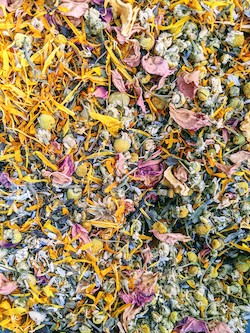 ChristinaCEO
ChristinaCEO"Why did you sign up to the course? As a way to go deeper into the knowledge of herbalism, but under the perspective of PTSD and trauma. Seemed rooted in reality vs just learning of straight up plant properties in a bubble.
What are you doing differently as a result of the course?
Eating more fruits and veggies! The slide of how plants may have properties of nutrients we have yet to understand stuck with me so I've been integrating it into my diet more.
How are you practicing herbalism now?
Taking it slower than ever. Sticking to one main character plant a month and working with it in different ways to understand its effect on my body.
Are there any particular plants you've connected with?
Milk thistle, dandelion, and sarsaparilla are my mains at the moment.
How was it different from other courses you've taken or other things you've tried? Different from some books I've read which just plainly state the plant's properties. Which can be nice in some cases, but it's also important to acknowledge the difference of effects with each person. Not only the biological difference, but what they have emotionally been through. This course really dives into that and gives perspective that is far from cookie cutter."
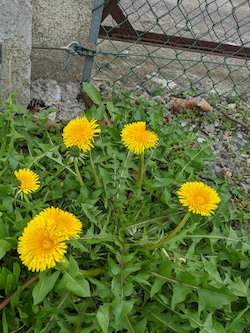 TiffanyCEO
TiffanyCEO"The herbalism for PTSD course by Nicole and Solidarity Apothecary has absolutely changed my life for the better and shifted my perspective on so much. I’d started herbalism studies more broadly about nine months before enrolling and the course was very accessible whilst still containing so much valuable information - saying that I don’t think it would be strictly necessary to have prior herbalism knowledge. Nicole has a very clear but personable presentation style and the course slides are well laid out. I was thrilled by the amount of references and further resources provided. I could not recommend this course more highly, especially for anyone with experience of trauma or anyone wanting to support those who have (which at this point I think is probably most of us)."
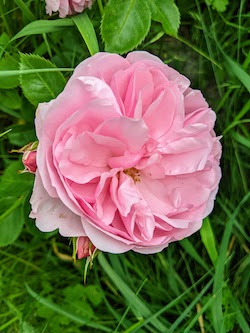 ImogenCEO
ImogenCEO"I love everything Solidarity Apothecary does, from Nicole’s books to her solidarity campaigns for people in prison. So naturally the Herbalism and trauma course is well written, clear, full of knowledge and expertise but as always led by values and deep passion for community and planet."
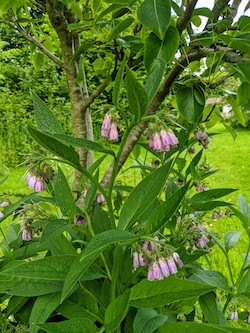 JayCEO
JayCEO"This course was able to thread something I’ve been looking for in my early herbalism studies — a solid base for getting footwork, grounded in a radical understanding beyond some white washed woo-woo. As someone who also includes more spiritual connectivity in their practice, this course was also a beautiful approach to connecting intimately and cultivating relationships with the herbs themselves. Have already recommended it to several of my friends!"
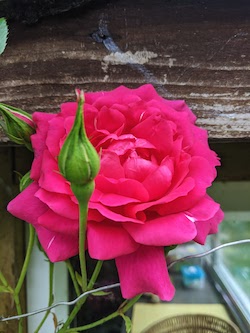 AllyCEO
AllyCEO"I was called to enroll in Nicole’s Herbalism, PTSD and Traumatic Stress course. I have been formally training as an herbalist here in the states. As someone who suffers from PTSD and feels the impact that trauma has on our multifaceted beings, I found this course to be helpful. I love getting perspectives of other herbalists who have very different lived experiences of my own. Nicole’s work with those who survive state violence is inspiring and provides a perspective I encourage everyone to engage with. I love that Nicole provides us with many studies and is conscious of their collection."
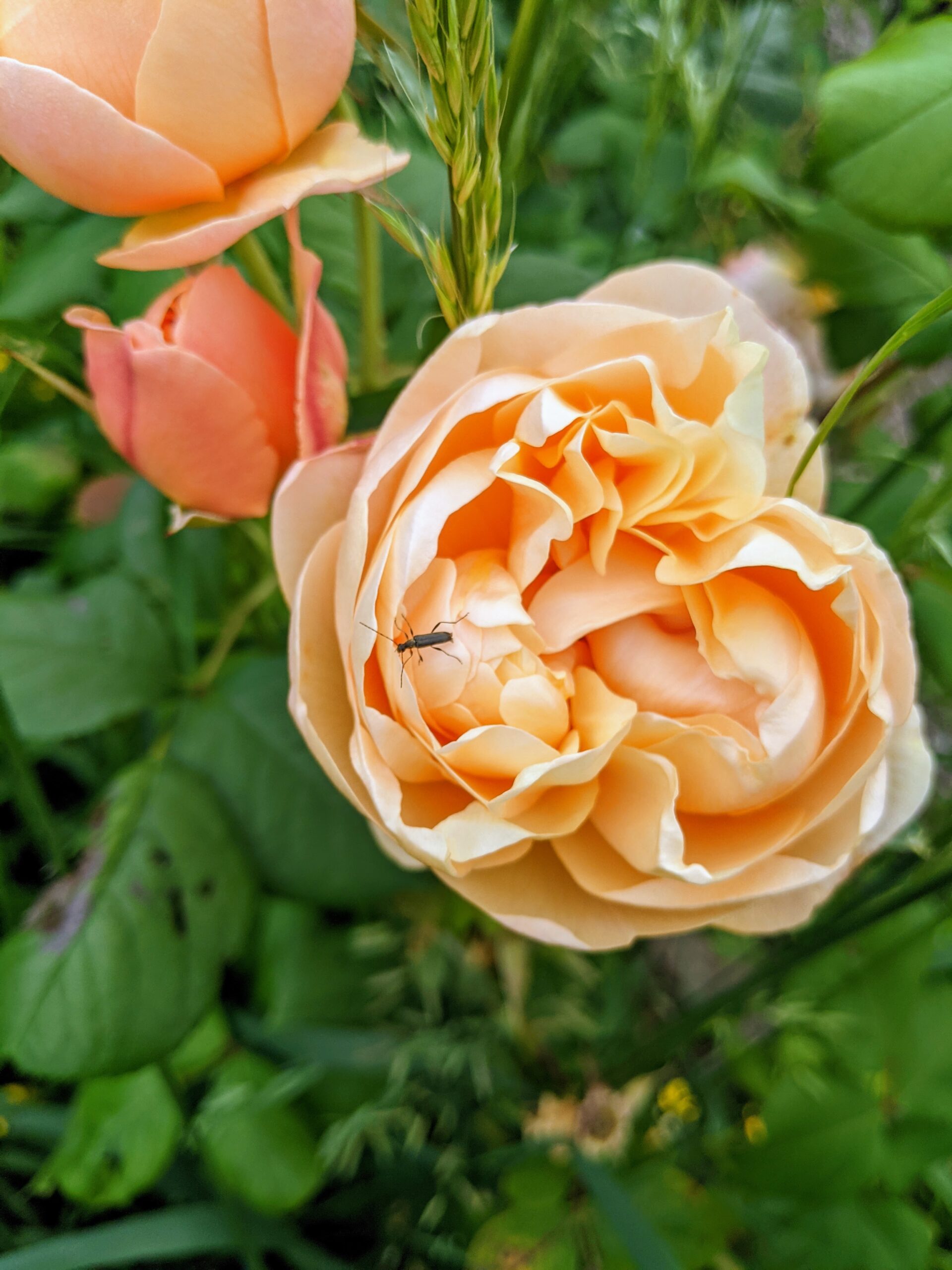 JuanitaCEO
JuanitaCEO"I have found this course to be such a supportive companion on my journey with the plants and in working with communities. It's not only guiding a deeply personal practice and source of wellness and resilience... The course has also deepened my understanding in some really key ways around restoring collectivity to our understandings of mental health and trauma, and how we create and approach practices of wellness and resilience in meaningful and sustainable ways - beyond the individual. This course is so rare in its bringing together of the personal, the spiritual, the political, the systemic and the mysterious. This is a radical kind of herbalism which feels ever more vital and I'm so grateful to receive this wisdom and inspiration."
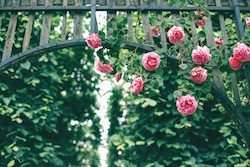 Elhttps://www.wearecominghome.co.uk/
Elhttps://www.wearecominghome.co.uk/"I was so thrilled to find and take the Herbalism, PTSD and Traumatic Stress course last year. It is so important in these difficult times full of trauma to know how to use plants to help heal, soothe, and alleviate these stressors. The course was laid out well, easy to follow, and fantastic information. I highly recommend it to all herbalists and plant minded friends. Thank you!"
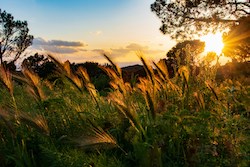 MelodyCEO
MelodyCEO"I have been working my way slowly through this course, I love that I can take my time with it.
So far the course has given me a better understanding of my own trauma and what herbs can be useful or ones that shouldnt be used depending on many factors. I'd recommend this course to anyone who is interested to learn about herbalism. I'm excited to be starting this learning journey here, it's already leading me to enjoy gardening more, helping make herbal care packs, foraging and pretty much anything plant related."
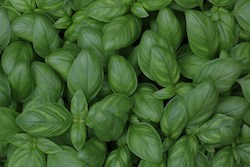 GillianCEO
GillianCEO